#its important that words preserve their meanings
Text
"Oh my god I love her so much! She's just the cutest war crimina-!"
And I stop reading.
It honestly kind of bothers me just how casually the term 'war criminal' is tossed around these days.
Just because they've killed people doesn't mean they're a war criminal.
Just because they're mean doesn't mean they're a war criminal.
Just because they've FOUGHT IN A WAR doesn't mean they're a war criminal.
I get that Tumblr is always looking for big, funny new phrases to chew on like dog toys, but maybe we should pick something other than the one that has extremely awful real-world implications.
War crimes are some of the most unspeakably evil things humans can do to each other, and using 'war criminal' as an ENDEARING term is just kind of pathetic. Stop. If you're going to use it, use it properly. Don't make 'war criminal'' become some stupid, cutesy, utterly meaningless term.
Because honestly, that's something TikTok would do.
#yes this is about the bg3 community#none of the companions are war criminals#i dont know why you would WANT THEM TO BE but theyre not#baldur's gate#baldur's gate 3#baldur's gate iii#lae'zel#bg3#minthara#minthara bg3#its important that words preserve their meanings#especially when theyre words with THAT MUCH meaning
519 notes
·
View notes
Text
important ! In recent years especially this year I’ve noticed a lot that the internet language picked up so many Islamic phrases and, from a muslim perspective, it makes the internet a little more welcoming.
the thing is, a lot of the time with Islamic phrases you have to be careful about when and where to say them they hold their own weight and demand their own respect so here is a list explaining each phrase and some notes about it.
In sha allah
It means “ If God wills “. It’s mostly a response that can mean yes or no. If someone asks you to do something you can say in sha allah as in “ I heard you and I’ll try to do itc but I can’t claim that It will happen “ . Muslims say it because we’re unaware of what future holds it’s actually blasphemous to claim to know the future, so saying so means “ If it’s the will of god it will happen if not it won’t “ and you’d also say it about future events.
Ma sha allah
It means “ this is what god intended “ and it’s a compliment. Saying so is like saying WOW! But it’s also kind of a prayer of protection? If I see someone with pretty hair I should say “ Ma sha allah your hair is very pretty “ the ma sha allah protects the person from the evil eye. By saying that I’m also saying I’m not jealous I’m genuinely enamored and I don’t wish any harm to go to it.
Astagfurullah
it means “ to god I repent “ or “ from god I seek forgiveness” it’s usually used when you make a mistake but people also use it when they see something bad or when they want to avoid saying something bad. Like once my card refused to work and I’d say that so I won’t say any curse words and to calm down my anger
wallah/wallahi
okay this one is important. This one shouldn’t be used so lightly. It means “ by god’s name “ and it’s basically swearing in Allah’s name. You are only supposed to say it if you genuinely mean what you’re saying. It’s such a heavy word that I only say it very rarely and if you say it and don’t follow up on what you said you have to fast for three days as repentance.
ya allah
ya is an addressing word? Like talking to someone or calling them? Like saying O’ ( someone ) so ya allah means O’ god
Al hamdullilah // hamdullilah
it means ‘ praise/thanks to god ‘ said when something good happens or when you feel relieved about something— for example, my shirt is stained badly and I’m worried it won’t clean well. I clean it and the stain is gone so I say “ al hamdullilah “ kind of like phew!. Sometimes people say it as an answer when they’re asked how they are it can either mean things are good or bad but we preserve .
One more note is that with the name of Allah you should also be careful it’s not supposed to be written on papers that’ll get stepped on or lightly used in art because it also has its own weight it’s regarded heavily. Like even in home decorations it should be elevated and not overshadowed. If I have to throw away a paper I have to sit down and color over the name of Allah or burn the papers so it won’t get thrown in trash.
another note is that those phrases aren’t Muslim exclusive. Some Arab non-Muslims use them as well. This is only my explanation from a Muslim perspective.
Another another note is this is what I can remember at the moment but if you have additions or enquiries let me know
12K notes
·
View notes
Text
My boyfriend the Bad Guy- Oscar Piastri x Teacher! Reader
Plot: Oscar surprises you in a class that you’re covering for on a day before a race weekend.
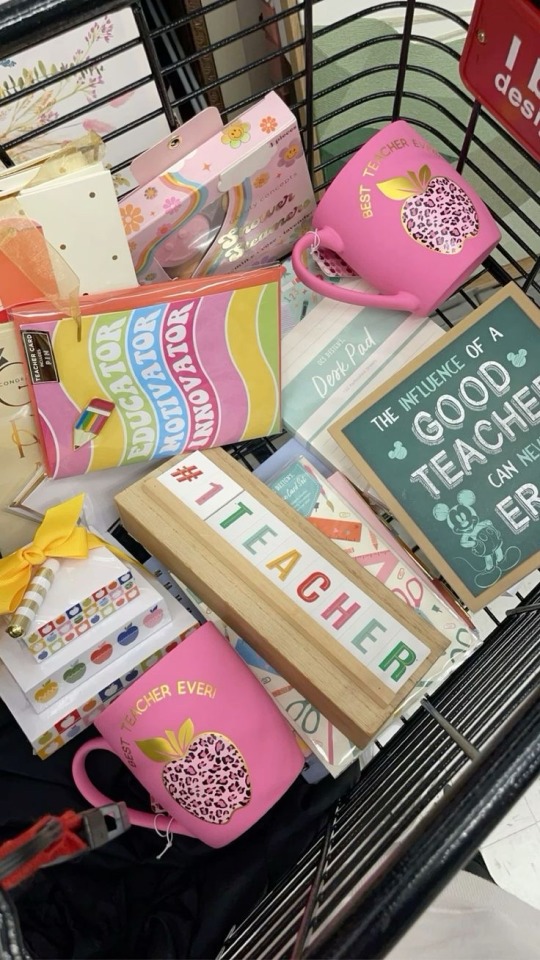
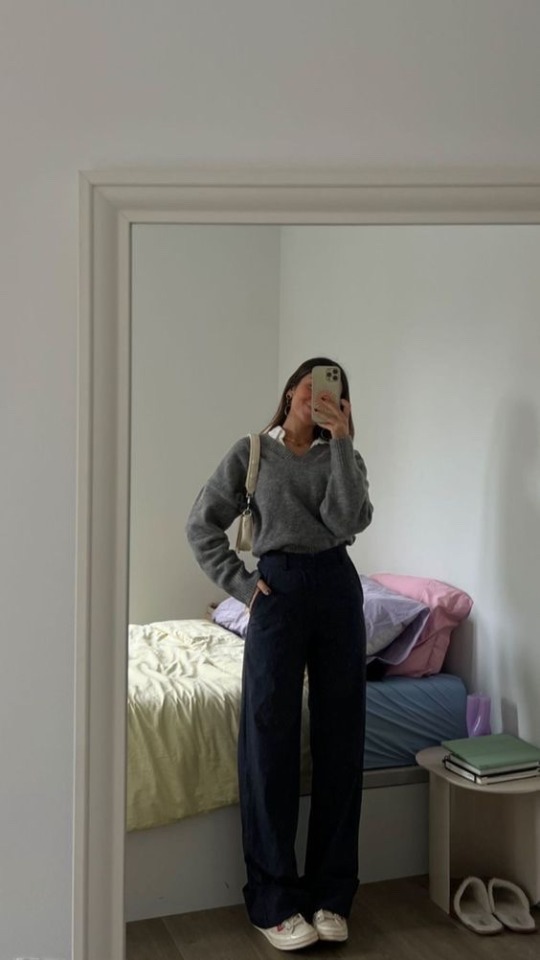

“Okay guys so Mrs Copani won’t be here for the rest of term, but that means I get to teach you guys all about … the rainforest!” You exclaim to the young children in your class. You were currently covering for a school in your district whose teacher went on maternity leave, it was your first job as a teacher rather than a teaching assistant because you were so young.
“Now, this project will be very fun! We’re going to do lots of arts and crafts and at the end of term Headmaster Kelvin has organised a trip” you tell them excitedly and they all start chatting!
“We’re going to a rainforest!” One of them exclaims.
“My mum says they’re a long way from us!” Another chips in.
“Are we going far for this trip?” Another asks a little confused.
“Okay okay settle down! Now you’ll learn that Chloe is right and that there aren’t any rainforests near us. The closest one would be Africa, and I can’t take you guys all the way there … but in the UK we have a place where they have these biome pods called the Eden Project so we’re going to take you there” you explain and they all nod.
“Okay so let’s start on some facts about the rainforest. Does anyone know anything about the rainforest that they can tell me!” You ask.
“It rains a lot!” Dylan shouts and you nod.
“That’s right! It’s helps that its in the name right? But rainforests have a lot of warm humid rain all year round. 79-394 inches. High for comparison is about the height of a tree!” You exclaim and gaze round seeing the fascinated look on all the kids faces.
That was your favourite part of teaching!
“And when you look at a rainforest … like this one” you say getting up a picture of one of the interactive whiteboard. “What do you see!” You ask looking around the classroom.
“Lots or Green” AJ shouts and everyone agrees.
“Mmmmm that’s very true. And what is all that greenery, some of you might have them in your garden at home! We have some in the gardens here and Miss Y/L/N has a few on her classroom windowsill” you offer helpfully, a girl raises her hand.
“Gabby?”
“Plants Miss!” She squeals and you nod with a smile on your face.
“Very good! Now the rainforest is very important as even though only 10% of earth is made up of rainforests … it has the most plants and animals there which helps us” you smile.
“Why miss?” Connor calls out and you smile.
“The trees around us, even the ones here release something out of them that go into our atmosphere and it turn it helps us breath. That’s why trees are so important and it’s why when we use paper, we always ….” You pause waiting for them to finish your common phrase.
“Recycle it” they all giggle and you nod.
“That’s right!” You smile at them all.
“Okay now when you all have a cold what does you mum and dad give you to make you feel all better?” You ask walking around the room.
“Matt” you say seeing the boys hand raised.
“Medicine!” He cries out in joy.
“Lots of those medicines come from the rainforest, that’s why it’s important we preserve it!” You teach them, you could never be to young to teach about protecting the planet.
“What’s preserve?” One of them asks with their head cocked to the side.
“Hmmmm that’s a difficult word to describe. Okay so let’s pretend you guys are … the Avengers” you grin and they all gasp happily.
“I wanna be Captain America”
“I’ll be Thor”
“I want to be Black Panther”
“I’m Kate Bishop”
“Okay okay you can all be whoever you want! But you guys need to protect the environment from all the bad people out there!” You grin, knowing this was all just a bit of fun but still educating them on what’s important.
“Who are the bad people” one of them asks, just before a knock is heard on the classroom door. You look to the left seeing Oscar there watching you with a soft smile on his face. You hop up from your desk walking over to the door.
“Here is one of the villains you have to defeat” you say as you open the door to your boyfriend.
“He’s a bad guy!” One of the girls ask, and you know you’ve just potentially started her obsession with always crushing on the villains in future movies and books she watch.
“But Miss that’s your boyfriend” they all giggle at this and you grin too, Oscar just standing there confused as to why you’re now all of a sudden calling him a bad guy.
“Mmmm and why am I a bad guy?” He asks looking at you with his polite cat smile.
“Who knows what Oscar does for a living, do any of you like Cars?” You ask and they all gasp.
“Miss miss I know I know!” Ollie cries out.
“Yeah?” You asked.
“He drives race cars!” He says on his knees rocking back and forth.
“He does! And he travels all over the world to do it, meaning he doesn’t help the environment, he does the opposite!” You say knowing just how astronomically high your boyfriends carbon footprint was.
The kids then all started to ask Oscar questions about racing, many of them being Lightening McQueen related.
Eventually it was the end of the school day, Oscar kindly helped you pack up the classroom before leading you out to the car park where his McLaren was parked.
“Thank you for coming to get me baby” you smile and he takes your hand guiding it to the gearstick so he can keep a hold of you while he’s there.
“You’re welcome! How was your first fall day teaching them on your own?” He smiles rubbing his thumb along your hand.
“It was really good, we’re starting a rainforest project and so we’re going to make loads of charts for the board I created and at the end of term we’ve got a trip organised!” You explain and he can’t help but grin at how excited you seem.
“Woah, that’s really cool! Do you still think that you’ll be able to come this weekend?” He asks knowing that where you taught Monday to Thursday you had the perfect opportunity to spend GP weekends with him.
“Of course I am baby, I have my flight booked for Thursday night, I’ll get there Friday Morning” you admit and he smiles bringing your hand up of the gearstick and in front of him mouth. He kisses it lightly.
“So where are we going, this isn’t the way home” you ask once you notice your on a different main road.
“Somewhere Lando showed me, I wanted to take you there. I think you’ll really like it” he explains and you nod.
Eventually you come up to a little park, he takes a rucksack from the boot, taking your hand and walking through the afternoon sun with you to the edge of a large pond, that had a wooden bridge going over the middle of it.
“Wow this is gorgeous” you exclaim looking at the surroundings before taking some pictures. You get one of yours and Oscars feet and then a selfie of you guys with the lake in the background.
“I love this, it’s so peaceful” you breathe out a relaxing breath. You and Oscar walk and talk, both having a busy schedule ment that moments like these you could yap to each others hearts content.
He eventually started to lay out a blanket, it was getting a little cooler as the sun got lower and lower in the spring afternoon.
“I brought some wine, and some cheese and grapes. I know you’ve been wanting to go out for a while with the girls but you haven’t had time… so I brought girls night too you” he smiles sheepishly hating how busy both your lives were individually and with each other. You saw your friends maybe once a month at best, you were very lucky they were so understanding.
“I love you Osc” you say leaning into him, kissing his cheek, a blush forming across his nose.
“I love you too baby” he smiles.
You both sit on the blanket leaning into one another while continuing your previous conversation, and sharing chaste kisses every now and then, tasting the rich one on each others lips.
Intimate and personal time like this with Oscar would always be your favourite.
y/user
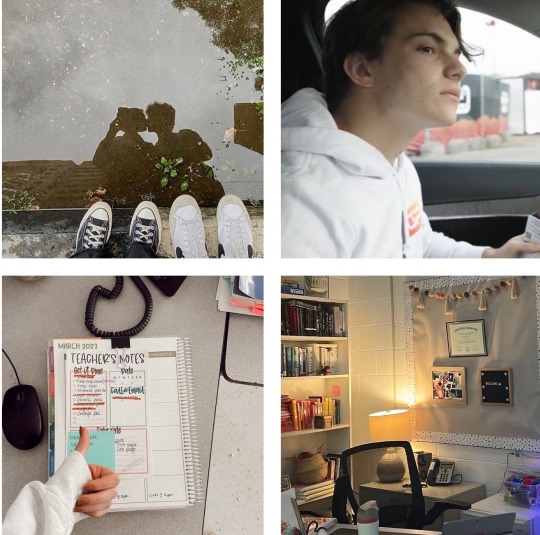
Liked by oscarpiastri, landonorris and others
y/user: Oscar surprised me on my first day today and took me out afterwards on a date :) How sweet can he get!
View all comments
oscarpiastri: Love you ❤️
-> y/user: I love you more 🥺🌸❤️
ybff: omg you guys are so cute! Seeing you when?
-> y/user: soon for sure! After class coffee? Mrs Copani has gone for maternity leave so I’ll have this post for a while!
user: Billy raves about his new teacher in class today! Thank you for making it engaging!
-> user: I agree Madison came home with the biggest smile on her face today! Thank you Mrs Y/L/N
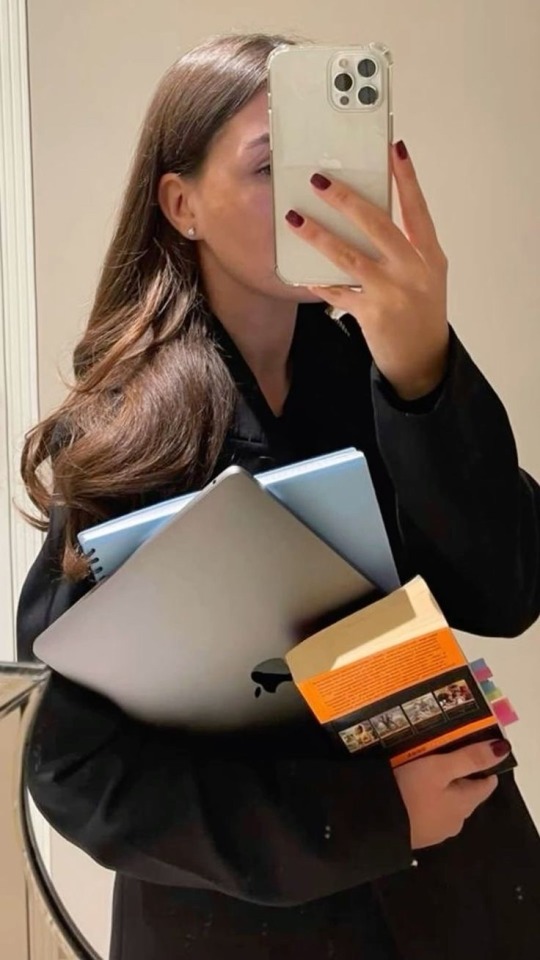
Instagram Story Caption:
First day on the job 🌸 Miss Y/L/N
Taglist:
@littlebitchsposts @hockey-racing-fubol @laura-naruto-fan1998 @22yuki @simxican @sinofwriting @lewisroscoelove @cmleitora @daemyratwst @lauralarsen @the-untamed-soul @thewulf @itsjustkhaos @purplephantomwolf @chasing-liberosis @summissss @gulphulp @starfusionsworld @jspitwall @sierruhhhh @georgeparisole @youcannotcancelquidditch @tallbrownhairsarcastic @ourteenagetragedy @peachiicherries @formulas-bitch @cherry-piee @spilled-coffee-cup @mehrmonga @eiraethh @curseofhecate @alliwantisadonut @dark-night-sky-99 @i-wish-this-was-me @tallrock35 @butterfly-lover @barnestatic @landossainz @darleneslane @barcelonaloverf1life @r0nnsblog @ilove-tswizzle @laneyspaulding19 @malynn @viennakarma @landosgirlxoxo @marie0v @yourbane @teamnovalak @nikfigueiredo @fionaschicken @0picels0 @tinydeskwriter @ironmaiden1313 @splaterparty0-0 @formula1mount
#f1 imagine#f1 x reader#formula 1 x you#formula 1#formula one#formula one fanfiction#formula one x y/n#formula one x you#formula one x reader#formula 1 x reader#formula 1 imagine#formula 1 fic#formula 1 fanfic#oscar piastri series#oscar piastri mclaren#oscar piastri masterlist#oscar piastri angst#oscar piastri fanfic#oscar piastri x you#oscar piastri f1#oscar piastri one shot#oscar piastri imagine#oscar piastri#op81 x you#op81 fluff#op81 imagine#op81 x reader#op81 fic#op81
699 notes
·
View notes
Text
Something I’ve been chewing on for this go-around of Dracula Season is the fact that, for all that I am absolutely 110% on board with the whole ‘Dracula wants Jonathan for himself, calls dibs, wants first taste, wants to keep him as part of the castle permanently, I too can love~ et cetera’ deal, I can admit now that I’ve been overlooking one very key part of the whole Bluebeard wifery setup.
And that’s the unavoidable fact that Dracula fully intends to leave Jonathan Harker to be drunk and collected by the Weird Sisters.
Now there’s all manner of guesswork to make about what exactly these three’s relationship to Dracula really is. A personal harem is usually the go-to, and what I usually land on as explanation, considering how things will play out in the future regarding his usual choice of vampiric victim. But others have suggested familial connections, going by Jonathan noting a couple similar traits between the two brunettes, ala facial features, hair, the same red eyes and so on, leaving Blondie as a potential wife the Count turned along with their daughters. Or hell, maybe they’re all actual sisters. We never get to know.
All we know is that they accuse Dracula of ‘Never loving,’ while Dracula stares meaningfully at Jonathan, insisting otherwise. And claims that the trio themselves know it is so from the past. Whatever past that is.
To that end, the Weird Sisters matter to Dracula. Enough to keep them fed, enough to not even put up a full villain monologue at them when they go against his orders to try and snatch Jonathan out from under him, followed by laughing in his face. Beyond his far-too-intimate interactions and abuses with Jonathan, this is the closest we get to seeing Dracula trying to be close with and/or properly*** interacting with someone. An exchange that ends not only with handing over the poor stolen baby in the sack, but outright promising Jonathan to the Sisters once Dracula is finished with him.
And that’s sticking with me this year. Because for all that I’ve joked and memed about it in the past, it never really whacked me over the head with the import and terror that comes with Jonathan’s opening line in this entry.
God preserve my sanity, for to this I am reduced.
Reduced. That’s the key word here.
Even if he doesn’t know all the rules, he knows now that he is no longer just a temporary prisoner. Not even a mere murder victim waiting out the clock. No. He has been reduced to a living decanter. A possession there to be nursed from and used and given as a gift from Dracula to his companions. Like a toy or a new pet.
At the risk of slight spoilers (avert your eyes first-time Dracula Dailiers!), two important lines are yet to come during Jonathan’s stay in Vampire Hell. One from Dracula:
But I am in hopes that I shall see more of you at Castle Dracula.
(Yes, he does think he’s very funny. Prick.)
And another from Jonathan:
At its foot a man may sleep—as a man.
Two vital beats.
The first, because it is a winking confirmation to all that Jonathan has feared. Namely, that Dracula and the Weird Sisters mean to never let him leave the castle again, alive, dead, or otherwise.
The second, because it shows that for all Jonathan is not aware of, he does rightly suspect that there is more expected of him than being a mere meal to have and discard. He knows he is not due for a fleeting pain and escape, even via death. Because Dracula wants to ‘love’ him. To keep him.
And Dracula will do so because he keeps the Weird Sisters, and they will keep him. A parting gift from their loving lord of the castle. The conqueror’s playbook in miniature.
I turned you. You turn him. I have you all.
This, buried under the veneer of:
See girls? I care! Here, a fine new plaything to keep you company. Housebroken already.
(To this I am reduced. To this I am reduced. To this I am reduced.)
There’s time right now. However much time Jonathan can win by playing a good guest. But if he doesn’t get out by the time Dracula is done with him? He lives the rest of his human life as a wine bottle and then all of eternity after that as joint undead property.
Better hope your acting skills are up to the task, Mr. Harker.
#Happy Undead Girl Gang Day to you Jonathan#jonathan harker#brides of dracula#dracula#re: dracula#dracula daily
654 notes
·
View notes
Text
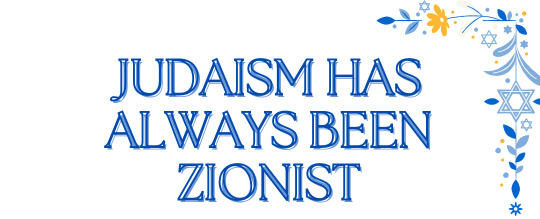
Judaism is a native religion and identity, so like all indigenous religions, it has ALWAYS sanctified the bond between the tribe and its ancestral land:
* Jews, no matter where around the world we are, pray in the direction of the Hebrew Temple in Jerusalem.
* Israel, Jerusalem, and Zion are mentioned in the Hebrew Bible hundreds of times, often in connection to the importance of the bond between the land and the Jewish people.
* The Hebrew calendar and Jewish holidays are based on the agricultural year as experienced in the Land of Israel. For example, we celebrate Shavu'ot, the Jewish festival of the harvest, during the Hebrew month of Sivan, which is roughly around the Gregorian month of June. In Australia, June is the rainiest month of the year, with severe temperature drops, absolutely not the right time for the harvest. But Australian Jews still celebrate Shavu'ot at the same time as all other Jews, around June. Because we ALL honor and preserve the agricultural cycle of our ancestors in Israel.
* Many Jewish prayers express a desire to return to Israel, for example with the phrase, "Next year in Jerusalem."
Here's a greeting card, drawn at Linz, a Nazi concentration camp in Austria, which was turned into a DP (displaced persons) camp at the end of the war. The card features the above three Hebrew words (you can see the freed prisoners of the camp on the left, heading towards a land with palm trees on the right, with one of the buildings having a Star of David on top):
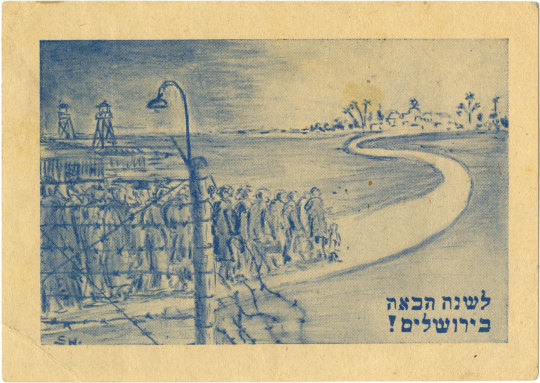
* The holiest site for Jewish people in the entire world is the thousands of years old Temple Mount in Jerusalem, where the Jewish temple stood, in Israel.
* Several Jewish holidays explicitly celebrate the Zionist notion, meaning the importance of the bond between the Jews and the Land of Israel. Hanukkah is a celebration of the native Jews fighting off the Greek occupying forces, and re-establishing Jewish sovereignty in Israel, and the freedom from religious persecution this allowed Jews, by re-dedicating the Hebrew Temple in Jerusalem to Jewish worship, after it was defiled by the Greeks (including by re-lighting the Temple Menorah). Passover celebrates the deliverance of the Jews from Egypt, and the start of their journey back home, to their ancestral land in Israel, with the Passover meal ceremony including thanking God for bringing Jews back to Israel, and for building the Temple in Jerusalem for them.
* The language of the Jewish people is Hebrew, which is the last Canaanite language, the last of the languages spoken by the native peoples of Israel. Hebrew is specifically tied to the geography of Israel. For example, in the Bible, the Hebrew word for "west" is also the Hebrew word for "sea," because Israel's western border is the Mediterranean Sea. Similarly, the Hebrew word for "south" is also the Hebrew name of the desert that makes up the southern part of Israel, the Negev. Every Jewish language, which developed in the diaspora (such as Yiddish and Ladino), features words borrowed from Hebrew.
Here's an Israeli poster made in 1949, honoring "Sea Day" and featuring a part of a biblical verse (Genesis 28, verse 14): "And your seed shall be as the sand of the earth, and you will spread to the sea and to the east, to the north and to the Negev, and blessed in you and in your seed will be all the families of the Earth."

* Among the 613 Jewish mitzvahs, religious decrees that Jews must observe, one explicitly states that whenever possible, Jews should strive to live on their ancestral land in Israel. This is called in Hebrew, "mitzvat yishuv Eretz Yisrael."
* Among the 613 mitzvahs, there are 26 mitzvahs that can only be observed while living in the Land of Israel. These are called in Hebrew, "mitzvot ha'tluiot ba'aretz."
* Jewish homes have included for centuries a decorative piece hung on the eastern wall, and called "mizrach" (the Hebrew word for "east"), because that was the direction of Israel to most Jews. It usually included a biblical verse in Hebrew, often one that either mentions the east, Israel or Jerusalem, and also illustrations of Jerusalem or Israel.
Here's an 18th or 19th century mizrach from Germany:

* In Jewish synagogues, especially in Europe, the eastern wall was the most important one, because it was the one facing Israel. This wall was called, "kotel ha'mizrach" which means in Hebrew "the wall of the east."
* Oh, but the word "kotel" refers specifically to the walls of the Temple Mount. For example, the Western Wall, the only one of the Temple Mount's four walls accessible to Jews for centuries (and therefore the plaza in front of it became the second holiest place to Jews, after the Temple Mount itself) is called in Hebrew, "ha'kotel" (the wall). So why would a synagogue wall be referred to as "kotel" as well? Because every Jewish synagogue is called "mikdash me'at," a lesser temple. Every Jewish synagogue is a reminder and placeholder for the destroyed Jewish Temple in Jerusalem.
* Accordingly, many Jewish synagogues feature reminders of the Beit Ha'Mikdash (the Hebrew Temple). For example, this holy ark, from a synagogue in Romania, which survived the Holocaust, and is today presented at Yad Vashem (Israel's national Holocaust museum), includes two pillars on its sides, a reminder of the Temple in Jerusalem's pillars believed to have been build by King Solomon. The holy ark's pillars are named exactly like the Temple's two pillars, Boaz and Yachin. This holy ark also features two hands, they're meant to be the high priest's, while he's performing the priestly blessing, an ancient Jewish ceremony that was conducted on the steps of the Temple in Jerusalem.

* In fact, over the centuries, one of the most prominent Jewish symbols is the menorah, which is a reflection of the candelabra eternally lit in the Jewish Temple in Jerusalem.
The Temple Menorah being stolen by the occupying Romans, as seen on the Titus Arch in Rome:
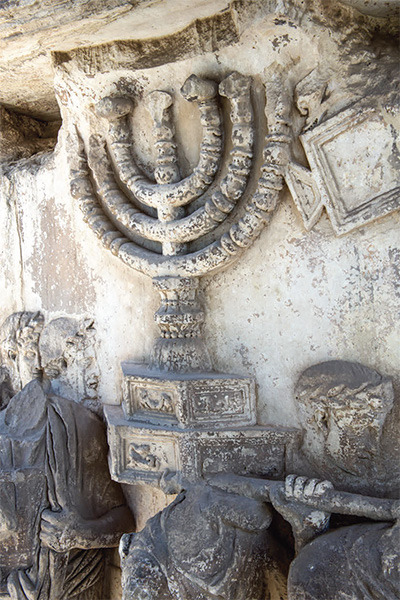
The menorah as incorporated into jewelery, as a Jewish symbol, goes back thousands of years:
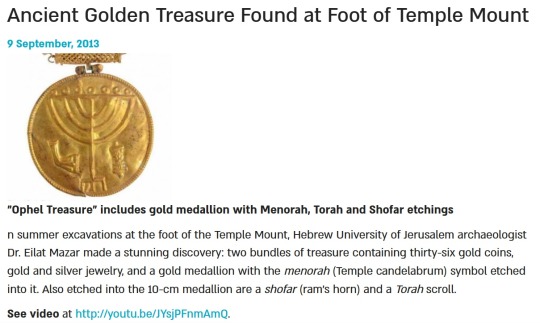
* For centuries, Jews created Jewish art and culture, which expressed Zionist longing. For example, the Sephardi doctor, philosopher and poet Rabbi Yehuda Ha'Levi writes what is maybe the most famous of the "Zion poems" while living in Islamic-occupied Spain: "My heart is in the East, and I am at the end of west / How shall I taste what I eat, and how should it be an enjoyable taste? / How shall I repay my vows and commitments, while / Zion is in the ropes of Edom, and I am in the bonds of Arabia? / It would be easy for me to leave all of the good of Spain, just like / It would be precious to me to witness the ashes of a ruined temple."
* In 1140, Rabbi Yehuda Ha'Levi finally fulfilled his wish, and boarded a ship for the Land of Israel. We don't know what happened to him, but the phrasing in a Hebrew letter, written by Jews who knew him, and found in Egypt, implies that he was murdered. For almost 2,000 years, it was dangerous for Jews to try and return to Israel, and it certainly wasn't possible on the scale of a national movement. Jews knew it was dangerous. And yet for centuries, despite that, individual Jews like Rabbi Yehuda Ha'Levi persisted in attempting this return. This is a part of Jewish history. It's not just that there was a small number of Jews, who managed to remain in Israel despite the repeated expulsions and massacres of Jews from our land, it's also that there was a small number of Jews who dared attempt the return to Israel continuously, over centuries, and neither of these things would have happened had Judaism not been Zionist. Always.
* For centuries, every Jewish wedding includes a part, where the groom recites an oath of loyalty and longing for Jerusalem. The text itself is taken from the Bible, from the second part of Psalms 137: "If I forget you, Jerusalem, let my right hand forget itself, let my tongue be glued to the roof of my mouth if I do not remember you, if I do not raise Jerusalem at the height of my joy."
* For centuries, every Jewish wedding included a symbolic reminder of the destruction of the Temple in Jerusalem, and our ancestors' following expulsion from the Land of Israel, by breaking a cup made of glass.
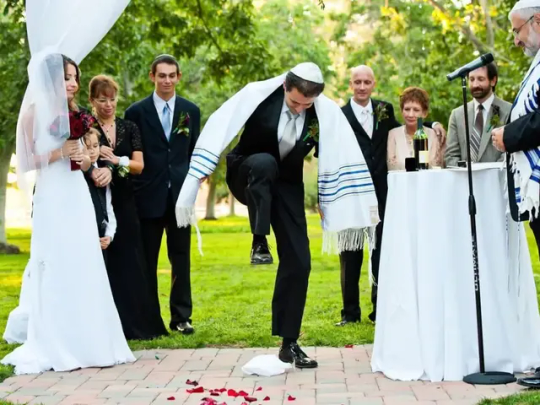
* For centuries, many Jewish homes featured an unfinished patch, as a similar reminder. I'm a secular Jew, but my real life bestie is religious, and her house has a hole in the eastern wall, intentionally left there.
* In fact, the destruction of the Temple, and the following expulsion of the Jewish people from Israel, is SUCH a traumatic and significant event for the Jewish faith, that there is a religious national day of mourning every year, on the ninth day of the Hebrew month of Av (the date when Jews believe the first Temple was destroyed in Jerusalem by the Babylonian occupiers, and the second one, re-built after an expulsion and return of the Jews from Babylon to their native land, was destroyed by the Roman occupiers), when Jews fast.
* Ethiopian Jews, who were probably the most disconnected Jewish community along the centuries, have a special holiday, called Sigd. This name is derived from the Hebrew word for worship or prostration, "sgida." It features asking God to return them to Israel. Since the state of Israel has helped the Ethiopian Jewish community to return to this land, starting in 1982, it has become a part of Sigd to celebrate it specifically in Jerusalem.
The Ethiopian Jewish community celebrating Sigd in Jerusalem:

* In fact, the three major Jewish holidays, other than Yom Kippur, are also called "the three pilgrimages" ("shloshet ha'regalim"), because while the Temple stood in Jerusalem, they included all Jews coming there to celebrate the holiday together. These three holidays are Sukkot, Pesach (Passover) and Shavu'ot.
Here's a piece of art depicting Jews in antiquity, coming from all over Israel to the Temple in Jerusalem for sholoshet ha'regalim:
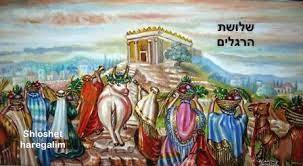
* The Hebrew Bible itself expresses the Jewish Zionist longing, the desire of the Jews to return to their ancestral land no matter what, after they were expelled by the Babylonians from Israel, the same desire that drove their return from their first exile, as recorded in the Bible, and supported by historical documents and archaeological finds. Here's the first part of Psalms 137:
Upon the rivers of Babylon, there we sat, and we wept, as we remembered Zion. On willows there we hung our harps, because there our captors asked us for songs, and our tormentors for joy. "Sing to us from the song of Zion!" How shall we sing God's song on foreign soil?
and here's the craziest thing about this list: there's a good chance I forgot some stuff.
This is posted in honor of the first candle of Hanukkah tonight, and the many Tumblr antisemites, who distort Jewish identity and history by claiming Zionism is incompatible with or has nothing to do with Judaism, people who in the name of anti-Zionism celebrated the biggest massacre of Jews since the Holocaust, who ignore Jews pointing out that anti-Zionism is inherently antisemitic, who prove it by going out of their way to deny Jewish native rights, and who think posting "Happy Hanukkah to my Jewish followers!" (as if Hanukkah isn't a Zionist holiday) covers up their antisemitism.
Happy Jewish sovereignty in Israel holiday to all who celebrate Hanukkah! I hope you really enjoy its foods! xoxox

(for all of my updates and ask replies regarding Israel, click here)
#israel#antisemitism#israeli#israel news#israel under attack#israel under fire#terrorism#anti terrorism#hamas#antisemitic#antisemites#jews#jew#judaism#jumblr#frumblr#jewish#hanukkah#chanukah#resources
906 notes
·
View notes
Text
This was a reply to someone else, but I'm making this its own post because so many people are being so evil right now re: Noah Schnapp.
You can find other, longer explanations with history and all, but all the places I've seen more or less agree with this:
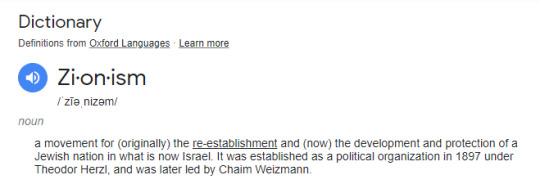
So you're all calling people to cancel Noah because he's in favor of a Jewish nation in what is today Israel. Which is a perfectly reasonable, decent and educated opinion to have, especially when you, to use a trendy term, "educate yourself" and find out why the state of Israel was created.
11000 dead Palestinians, half of them children
According to Hamas. Don't forget that, ever. They're the current, official government of Gaza, thus they're the ones who give numbers. This means that the real number could be 10, 1 million, anything in between. What I've read is that they probably give more of less accurate total numbers. What they fail to do, however, is distinguish between Hamas militants and civilians, and beteween civilians killed by IDF strikes, civilians killed by failed Hamas or Palestininan Islamic Jihad's rockets (which happens a lot), and Palestinians murdered by Hamas/PIJ (which also happens, a whole damn lot). They also don't specify how many civilians they have prevented or tried to prevent from evacuating or receiving aid.
11k dead people is a horrible number. Even 1 dead person is a horrible number. However, urban warfare in such a densely populated area is its own kind of hell, especially when the other side is fond of using civilians as human shields in every way possible. The fact that the number is 11k and not 50k, 100k, and so on, indicates that the IDF have indeed done a lot to minimize deaths. You don't genocide people by doing roof knocks, opening evacuation lines, dropping guided bombs, putting up an Iron Dome to deal with rockets while avoiding escalation, etc. simply because actual genocide, while a lot worse, is also cheaper, easier and faster than what they're doing. This is important because caling every act of war genocide dilutes the word, and there are actual genocides happening around the world. Also, there is a difference between striking military targets and causing civilian deaths as a side effect (what the IDF is doing) and planning and carrying out a massacre deliberately targeting civilians and inflicting as much pain and humilliation as possible on them. And there is a difference between doing so by breaking a ceasefire (which is what Hamas did), and defending your country because if you don't do that a terrorist group will anhilate you (which is what the IDF is doing).
Back to Noah. So far, these are the things that people have tried to cancel him for:
Traveling to Israel (a completely normal thing)
Having Israeli friends (another completely normal thing)
Condemning Hamas' horrible attack on October 7th (the decent thing to do)
Posting a statement saying he feels unsafe as a Jewish person in the US (which, given the rise of antisemitic acts in the world, including the US, including where he lives and where he studies, is a valid feeling to have)
Signing a letter, along with Shawn Levy, Brett Gelman, Ross Duffer and I think Cara Buono, asking Biden to press for the liberation of every hostage by Hamas. This especially shows the utter ignorance of the cancellers because, as it turns out, caring about every hostage implies a slowdown of IDF's actions (and, at the time, a delay of a ground invasion).
Supporting the existence and preservation of the state of Israel (once again, a completely normal thing). The fact that people are turning against him for these things says to me that the real reason you are all hating Noah is beacuse:
He's Jewish. Like, really really Jewish.
And the fact that this all comes from a place of antisemitism isn't hidden at all: I've seen y'all on here, on Twitter, Reddit, every other social media calling him slurs (such as "cunt"), censoring his name, pretending he's not part of the cast, asking the Duffers/Netflix to fire him, wishing him failure, doxxing him, calling on his classmates to physically assault him, etc. He doesn't need to educate himself: you guys are already teaching him a great lesson on why a Jewish state is necessary. If that's the treament he gets from his own "fans", what can he expect from the world at large?
#byler#noah schnapp#antisemitism#jumblr#stranger things#i know many people here are actual children or college students#who have never lived war or armed conflict#and this is baby's first social justice fight#but the way you're acting towards Noah is disgusting and evil#I'm not even jewish but I know what terrorism is like#and I know what it's like to have idiot 1st worlders be on the terrorists' side because they think they're “liberators” or something#harming the very people you think they help
900 notes
·
View notes
Text
Interior Department Announces New Guidance to Honor and Elevate Hawaiian Language

"In commemoration of Mahina ʻŌlelo Hawaiʻi, or Hawaiian Language Month, and in recognition of its unique relationship with the Native Hawaiian Community, the Department of the Interior today announced new guidance on the use of the Hawaiian language.
A comprehensive new Departmental Manual chapter underscores the Department’s commitment to further integrating Indigenous Knowledge and cultural practices into conservation stewardship.
“Prioritizing the preservation of the Hawaiian language and culture and elevating Indigenous Knowledge is central to the Biden-Harris administration's work to meet the unique needs of the Native Hawaiian Community,” said Secretary Deb Haaland. “As we deploy historic resources to Hawaiʻi from President Biden’s Investing in America agenda, the Interior Department is committed to ensuring our internal policies and communications use accurate language and data."
Department bureaus and offices that engage in communication with the Native Hawaiian Community or produce documentation addressing places, resources, actions or interests in Hawaiʻi will use the new guidance on ‘ōlelo Hawaiʻi (Hawaiian language) for various identifications and references, including flora and fauna, cultural sites, geographic place names, and government units within the state. The guidance recognizes the evolving nature of ‘ōlelo Hawaiʻi and acknowledges the absence of a single authoritative source. While the Hawaiian Dictionary (Pukui & Elbert 2003) is designated as the baseline standard for non-geographic words and place names, Department bureaus and offices are encouraged to consult other standard works, as well as the Board on Geographic Names database.
Developed collaboratively and informed by ʻōlelo Hawaiʻi practitioners, instructors and advocates, the new guidance emerged from virtual consultation sessions and public comment in 2023 with the Native Hawaiian Community.
The new guidance aligns with the Biden-Harris administration’s commitment to strengthening relationships with the Native Hawaiian Community through efforts such as the Kapapahuliau Climate Resilience Program and Hawaiian Forest Bird Keystone Initiative. During her trip to Hawaiʻi in June, Secretary Haaland emphasized recognizing and including Indigenous Knowledge, promoting co-stewardship, protecting sacred sites, and recommitting to meaningful and robust consultation with the Native Hawaiian Community."
-via US Department of the Interior press release, February 1, 2024
--
Note: I'm an editor so I have no idea whether this comes off like as big a deal as it potentially is. But it is potentially going to establish and massively accelerate the adoption of correctly written Native Hawaiian language, as determined by Native Hawaiians.
Basically US government communications, documentations, and "style guides" (sets of rules to follow about how to write/format/publish something, etc.) can be incredibly influential, especially for topics where there isn't much other official guidance. This rule means that all government documents that mention Hawai'i, places in Hawai'i, Hawaiian plants and animals, etc. will have to be written the way Native Hawaiians say it should be written, and the correct way of writing Hawaiian conveys a lot more information about how the words are pronounced, too, which could spread correct pronunciations more widely.
It also means that, as far as the US government is concerned, this is The Correct Way to Write the Hawaiian Language. Which, as an editor who just read the guidance document, is super important. That's because you need the 'okina (' in words) and kahakō in order to tell apart sizeable sets of different words, because Hawaiian uses so many fewer consonants, they need more of other types of different sounds.
And the US government official policy on how to write Hawaiian is exactly what editors, publishers, newspapers, and magazines are going to look at, sooner or later, because it's what style guides are looking at. Style guides are the official various sets of rules that books/publications follow; they're also incredibly detailed - the one used for almost all book publishing, for example, the Chicago Manual of Style (CMoS), is over a thousand pages long.
One of the things that CMoS does is tell you the basic rules of and what specialist further sources they think you should use for writing different languages. They have a whole chapter dedicated to this. It's not that impressive on non-European languages yet, but we're due for a new edition (the 18th) of CMoS in the next oh two to four years, probably? Actually numbering wise they'd be due for one this year, except presumably they would've announced it by now if that was the case.
I'm expecting one of the biggest revisions to the 18th edition to add much more comprehensive guidance on non-Western languages. Considering how far we've come since 2017, when the last one was released, I'll be judging the shit out of them if they do otherwise. (And CMoS actually keep with the times decently enough.)
Which means, as long as there's at least a year or two for these new rules/spellings/orthographies to establish themselves before the next edition comes out, it's likely that just about every (legit) publisher will start using the new rules/spellings/orthographies.
And of course, it would expand much further from there.
#don't ask me about the magazine and newspaper half of this#bc I do Not know AP style#except the differences I'm annoyed at lol#ap doesn't respect the oxford comma#hawaii#hawaiʻi#language#orthography#linguistics#language stuff#hawaiian#native hawaiian#united states#publishing#book publishing#indigenous#indigineous people#indigenous languages#language revitalization#language resources#editorial
407 notes
·
View notes
Text
arcane, populism, and why viktor is the odd one out (yet again)
as a piltover-anti, a silco criticizer, and a pacifist, i am very very interested in how arcane presents not just the political undertones of both topside and the undercity, but the characters/dialogue through which they communicate those undertones. allow me to use some political science bro lingo to air out some thoughts.
long, long post incoming.
there are 2 ideological struggles at war throughout s1 (and i can predict that the struggle will carry over into s2): neoliberalism and populism - in their broadest terms since we're talking ofc about a fictional show dealing with surface level political machinations. by neoliberalism, i mean a focus on the social, political, and cultural structures of a polity (piltover, for our purposes) refocused into a strictly economic vacuum. and by populism i mean a unifying belief that the existing political systems of a polity fail to adequately represent their constituents, so the masses choose to rally around a specific gripe or issue, i.e., class discrimination, xenophobia toward immigrants, etc. this, in turn, forms a populist party or movement. an applicable example i can think of would be Nasser's Egypt in the 1950s.
*i know these are weighty topics with very real world implications! i just want to separate the theory to apply to our favorite fictional world.
the political struggle in question is put forward immediately by piltover, who, though presented as a technocratic state, embodies crucial neoliberal ideals emphasized especially by up-and-coming counilor mel medarda, much like how fresh-eyed american economists blew up the economic scene in the 1980s with a revival of capitalist, free market enterprise. take how she seizes the advent of hextech, for example:


she quickly sees hextech's potential yet not from the solely intellectual standpoint that jayce and viktor do - for her, it is profitable, literally and in terms of international relations. her goal is for piltover to prosper, but she has no rose-colored glasses on; prosperity means capital gain, and she's willing to override piltover's political and social systems to achieve her goal. an important caveat is that she draws the line at ambessa medarda's progression into militant authoritarianism, which deserves a whole post of its own!
piltover's populism moment will come later. first, let's unpack silco, who is probably arcane's most blatantly political figure, and a masterclass in the merits and failures of left wing, class-based populism.

silco, having been spurned by the classism and xenophobia that piltover's elite proliferate, and assisted by his rampant shimmer operation, fills the vacuum that vander's pacifism opened up. though silco's methods are unilaterally cruel (argue with the wall), the undercity clearly invested faith in him at some point, especially as vander's credibility as a guiding figure wavered over the years. he was fighting alongside vander for zaun's right to exist as their own independent body. in other words, he was uniting the undercity toward a common cause because the existing political system failed their constituents. to quote councilor shoola: "they may not be our preferred constituents, but they're still our people."
the track record of populism in our real world frequently ends in the ruin that silco himself brought upon the undercity. the kingpin is too dedicated to self-preservation, sees himself as too central to the movement, which prevents both compromise and/or a necessary armed revolt (insert your own politics about self-determination here). see italy's right wing populism party, Lega Nord, as a real-time example of this phenomenon.
but arcane makes an interesting plot decision with jayce, a very unexpected and "unwilling" contributor to piltover's abrupt dip into right wing populism. the showrunners love foils!
in arcane lore, i think it's safe to say that jayce's moniker "the man of progress" is pretty tongue-in-cheek. both he and viktor have a bemused tone about it in the run-up to his speech, and jayce is taken aback by heimerdinger's insistence that he deliver said speech. but the glowing, savior-esque imagery can't be ignored, nor can jayce's quick switch into his councilor role, no matter how reluctantly he makes it.
jayce is confronted by 2 forces that he seeks to combat in his quick tenure as councilor: internal corruption and an ineffective governing body. the latter goal is inspired almost solely by viktor, playing into jayce's naivety as a fresh-faced political figure, but this will be especially important to note later on. the innocence he offers up to mel is quickly erased, transformed instead into an uncomfortable - and inexperienced - militancy:


important in the bridge scene to my analysis is the populist "out group," or the designation populists give to those whom they actively oppose, and this opposition serves as their basis for organization. in this case, it's the undercity (keep this in mind for viktor's role!!).
jayce's combined frustrations at the unrest in the undercity and the council's (namely heimerdinger's) refusal to act, to both save viktor and to deal with the undercity's looming violence, motivates him to act like silco for a short time. unsatisfied with the status quo, he unites a likeminded individual, vi, along with the enforcers, to undercut the political system he feels is unable to represent its constituents or act in an effective manner. however, UNLIKE silco, jayce's realizes the inevitable cost the method of violence has and refrains in the end. he returns to the council and capitulates to some of silco's demands in the name of a peace piltover and zaun always thought impossible.
jinx's complete undoing of this underscores the failures of populism, especially as an extended movement over time. she wasn't accounted for. it's common sentiment at this point that she didn't attack the council for political gain. she was not invested in zaun's independence. she did it out of her and silco's twisted parental bond, and thus undid piltover's brief instance of compromise and compassion.
so...where does viktor fit into all this? and what are his implications for neoliberalism vs. populism in season 2?
viktor is neither wholly within nor wholly outside the populist outgroup - though jayce unintentionally shoves him back there in the pivotal bridge scene. furthermore, viktor also makes use of piltover's technocracy. he seems to have had a "raise yourself up by your bootstraps" history in arcane, contrary to left wing populist insistence that neoliberal ideals make this impossible.
this compounds as a double alienation for viktor, who also is straddled with the complications of his disability. a lot of his story is searching for a fellow in arms, if you ask me, and he had that with jayce until the pendulum swung, hence his return to singed.


if we stop there, viktor represents the failing of these 2 very flawed political ideologies. he fits nowhere and arcane uses him adeptly as a symbol of the failings of binaristic ideologues and systems. but let's speculate some more!
i'm convinced that viktor, due to his ambiguous 3rd party role in the story so far, will be one of the central villains (if not THE villain, if you allow me to be admittedly hopeful/biased) in season 2. consult the innumerable very well written theory/meta posts about the subject for more details, but one piece of evidence i want to focus on is this inherent physical, cultural, and ideological separateness that is innate to his character.
can we see him allying ever again with piltover, knowing that there's a split incoming? even without outside knowledge of league lore, singed's damning prediction ("if you take this path, they will despise you") cannot go unheeded. alternatively, then, can we see viktor allying with the supposed jinx-as-revolutionary side? no. personally, i see him as becoming increasingly unwillingly to compromise his a) immediate survival; and b) his ideals, especially after being endlessly sidelined in his attempts to express them in acts 2 and 3. he's also just a loner, guys.
there's some controversy on this point, but i'm convinced that the finger-printed cultists/followers we saw in the s2 trailer are devoted to viktor. starting with the shimmer addict he touched in the teaser, he is accruing a following all his own. and since noxus is here, touting their authoritarian militancy to replace piltover's outdated liberal ideals, nothing that jinx's revolution OR viktor's following does can be apolitical. to organize and to fight is survival under s2's raised stakes.
there aren't any binary spectrums when it comes to political theory in my opinion, so i am prepared to witness viktor introduce an entirely separate totalitarian narrative into arcane. where it will surely lack in militancy, it will make up for in its domination of the arcane. my biggest speculation is that, as they always do, piltover will fold and compromise at the last minute, perhaps yield to noxus, and invest wholeheartedly in taking down viktor's BBEG cultist regime. and by isolating his narrative repeatedly in s1, the writers planned this out expertly.
even if i'm wrong about viktor as third party, i like to think my observations still stand about the specific and qualifiable political divisions between piltover and zaun. the biggest hole this leaves for me is the question: will arcane ever take a stand? they seem very averse to making a blatant political statement, but i think their pervasive anti-police thread makes it clear that we're not meant to sympathize with piltover yuppies or their seasoned, jaded councilmen. let me know your thoughts!
also, as a jayce fan and a fan of arcane's overall story, none of this is meant as a CRITIQUE of him, mel, or silco. as silco said, "we all have our parts to play." i believe arcane's very greatest strength is their archetypal storytelling, and these distinct character roles are crucial to the success and vibrancy of the story.
if you read all the way to this point - ily <3
#arcane#arcane season 1#arcane season 2#arcane s2#mel medarda#silco#jayce talis#viktor arcane#ambessa medarda#arcane analysis#arcane meta#sorry to word vom i'm in grad school now and writing about political realism#these things just fascinate me#and you know i have to viktor truth at the end
175 notes
·
View notes
Text
The Mundane Beside the Magical:
You want to learn magic and witchcraft, awesome! Go you! You wanna know what's important though? Learning the mundane at the same time as the magical.
I'm a firm believer in learning as much as you can about the things you're working with. To know a paintbrush, you have to paint. To learn an instrument, you have to play it. Anything you work with is a tool that, in an ideal scenario, will become an extension of yourself. You want to be in tune with your tools, you want to understand them as much as possible. It's learning how the tools respond to your interference. When you know these things inside and out, that, to me, is when you become an expert. Don't just learn the meanings of things, learn the reasons behind the meanings. Look up the etymology of that magic word you saw before you do the spell. Learn the historical uses of that herb and connect that to whatever its correspondence is. Learn why things are the way they are.
You want to learn ocean magic? Learn about the tides while you're at it. Learn how the ocean behaves, understand the sheer power behind the waves, the creatures of the ocean and all of the treasures you can find on the seashore.
Thinking about getting into green craft? Don't just learn about the magical uses of plants, learn about botany, and how to identify plants, understand how plants grow and thrive, and how different plants exist in nature.
Considering animal magic? Learn the Latin name of the species, maybe check out their anatomy while you're at it. Where does this animal find its niche? What does it eat, where does it sleep?
Getting into forest witchcraft? Learn about your local forests and trees. What kinds of forests there are, what preserving a forest can look like. Can you identify any trees of your own? How do different trees propagate?
How about weather magic? Learn meteorology, how to identify storm clouds, what atmospheric pressure does. Start to observe changes in the weather daily, how weather affects the wildlife around you.
Cosmic witchcraft more your vibe? Learn a little about space, study a map of the stars, learn the constellations in your night sky. Branch off into learning astronomy and cosmology, learn about planetary systems other than our own. If you want to keep it basic, learn the time it takes each planet to complete a rotation and revolution.
Crystals seem to be up your alley? Don't stop at the metaphysical properties, learn their scientific properties as well. Where can these crystals be mined? How rare are they? Can you tell the difference between imitations and the real deal? What's their number on the Mohs hardness scale?
Whatever you want to learn, branch out further than the magical. The mundane is just as, if not more important.
~Wander
205 notes
·
View notes
Text
The Witch and the Widow – Chapter One – The Lake
Laudna Bradbury had murdered her husband.
Maybe murdered. Apparently. That is what brought Imogen here - indirectly, at least.
Not that she's with the law enforcement or anything. Not that, definitely, though ironically being an officer - an interrogator - would suit her well, at least on paper. Passion and enthusiasm would be a different question - and that's why she's here. Sorta. Indirectly, again, for a different question. Words travel, by means of mouth or ink or thoughts (apparently, she had found out), even though thoughts should not travel past the head that they were made in. But they did, and continue to do so, and Imogen had heard enough accounts about the man himself (the Lady’s husband, when he was alive and after the fact), had seen enough women squashed under the boots of the men they were tied to to intimately know and understand a flash decision made in a moment for self-preservation-
all too often women tempered their instincts to allow themselves to become the soil underfoot rather than the sole of the shoe
so much as to say that Imogen does not care much if Laudna Bradbury had murdered her husband.
She cares more about what the words whispered and weaved and waded in the time after wrote:
Laudna Bradbury had used witchcraft to murder her husband.
The only utterances of magic Imogen had heard of, had seen, had unexplainably received taken telegraphed by inner voice and grey matter before that rumour, were her own.
Imogen needs answers, desperately, as though a necessity purely imperative like breathing and eating, and so she brought herself to the source of the lake before it divided and weakened and meandered from river to muddy stream to drink directly from her-
(it.)
Laudna Bradbury is a widow, a widow who continues to live on the estate her husband’s heraldry and wealth had afforded them, company kept by a small team of housemaids and gardeners and the like.
and it is a large estate, a lot to look after, for sure, certainly, with its couple hundred maybe more years in age and just as many acres. There's hairline cracks in the stucco, a missing roof tile here and there
but there is no denying that it is a fine example of architecture, certainly was the highest of fashion at the time. A grand country house with an East Wing and a West, bay windows and towers and pleasing ratios between alcove and doorways and arches and walled topiaried gardens that extend from north to south, illustrations in stained glass ornately framed with flowering climbing ivy
statues that step out from domesticated bordering jungles, now appearing more as gargoyles thanks to the decay of time, noses eroded like they have rotted off, birds’ nests of briars thorned crowns or horns
rosemary bushes skirt the main building’s façade, perfuming the sometimes hot-and-humid, more often brisk-and-grey air carried through the opened lead-lined boiled sweet coloured window panes into the dark mahogany-panelled and silk-embroidered tapestried interiors.
Off of the West Wing there is an extension nearing the height of the gargoyled walls that surround the estate. This is the wall that fortifies the Lady Bradbury’s private garden; with doors adjoining directly to her study - both of which are off limits. Imogen doesn't know much of pretty and imported flowers, but she knows local common sense, knows what berries to pick and which weed’s sap causes a blister that will never heal again should it brush her skin.
Through small cracks in the masonry delicate tendrils curl out; leaves crawling, surfacing, small purple flowers with yellow tear-drop centres blooming.
Deadly nightshade.
She wonders what else grows behind the wall, patiently biding its time until the decay of such allows it through.
It is in the stables that Imogen spends most of her own time; her years of experience working under Master Faramore awarded her an earnest recommendation, and it sure helped that a couple of the Lady’s mares and a stallion were from his own livery, that they had been raised and trained by Imogen's own hands before they left them.
She needs answers, so she has taken herself to them, to the lake to drink from. She observes from a distance, listens to any whisperings and wonderings that bed with her in the servants’ quarters.
The days are long, mostly spent between mucking and feeding and exercising and grooming the horses and watching the Lady Bradbury taking a walk around the herb garden with knees as muddied as the kitchen staff’s, or cutting bark segments from off of the trees that dot the grounds as if she were operating in front of an amphitheatre of flora and fauna students whilst Imogen brushes down one of the horses or shovels hay
and despite the distance and Imogen's best efforts to remain subtle, the Lady Bradbury’s eyes would sometimes catch hers observing (staring, admittedly), and she would smile, and perform a barely perceivable curtsey (one of many behaviours outside of expectations), and Imogen would tip her brimmed suede hat in return, and would think of how despite the fact that the Lady’s practices of class and boundaries and what is proper were different, a bit odd, nothing of the woman's behaviour suggested that of a killer - only the situation that she stood in - the peculiarly beautiful widow with a walled off poison garden. And so maybe the same is to be said of her magic, should she even be harbouring or practicing any (although admittedly her appearance certainly is bewitching…)
and it's like the instances before but unlike them - Imogen stealing glances of the Lady Bradbury as she potters about her estate (she probably really does potter, she fills so much of her time with crafting and making. Imogen wouldn't be surprised to see her pale skin elbow-deep in caked-on terracotta pigment digging out clay rich soil into old whisky barrels to have carried by willing hands to a throwing room with a secret kiln.) but on this day, when their eyes in new routine now inevitably meet across the wildflower-speckled field (that in itself is unusual, highly out of vogue, it isn't the acres of well-kept uniform lawn and paths laid with talking-point pebbles imported from the coast that the other estates boasted and Imogen had glanced when ferrying Master Faramore’s horses elsewhere) the Lady Bradbury takes pause, before she starts to make her advance towards Imogen.
shit.
She's been brushing the same patch of short thick hair on Foie Gras’ shoulder for so long that she's surprised there isn't a bald patch. Maybe the Lady Bradbury is worried as such. Maybe Imogen has been too obvious in her observing (admitted staring). Maybe she has been found out.
She feels her brow start to perspire, the muscles in her limbs wishing to move erratically and awkwardly and restlessly and to carry her to stand out of sight hidden behind the thick neck of the horse like an obvious child playing hide and seek behind a tree trunk, or to flatten the creases in her breaches and her linen tunic and pick out the strands of hair and hay that have lodged themselves into their weave, untwist the grasp of her suspenders over her shoulders - but she practices restraint - is trained and cautious and intentional and thorough she was only being thorough with the mare, casts her gaze in iron like the blacksmith hammering the horseshoes and steels herself for the Lady Bradbury’s approach.
Her skirts are full and structured and plumed by many layers of petticoats that hide the movement of her feet across the wildflower lawn, causing her to appear to be drifting like the bees do from petal to petal, pollen dusting her pleats though ghostly her skin in contrast to the fine fabrics that she dresses for the part, black in mourning, still, bodice tight and sleeve leg of mutton, an ornate decorative layer of black lace laying over each yard of textured textile like spider webs on porcelain patterns, her husband's tableware collecting dust in the kitchen cupboard.
real impractical for how tending towards practical the Lady dares to be, hands on, too busy for errant hairs in piano key ivory and ebony windswept and loose from the high bun she pins in place with a cameo broach, a memento mori engraved in silver and inlayed with ruby eyes and tied with red ribbons. Her skin also proudly displays the age and perhaps trauma that her hair does, lines from laughter and furrowed brows and the feet of the crows that cry from the top of the chimney pots
Imogen has heard her call them her children (the birds that is, not the wrinkles) - has heard her talk to them as if they are responding, oftentimes giving her own tampered voice to do so (and to Imogen’s amusement)
The Lady never had children of her own; those are their own rivers of rumours within themselves. Imogen did not care for that stream of gossip at all.
The Lady steps closer, and the yet-to-be familiar fog of her mind cocoons Imogen, water transmuted into mist against jutting rock at the plummet of rapids, relief from the laborious work and humidity, her previous restraint to keep her body in check breaking as she visibly swallows and licks her lips, suddenly aware of how dry they had been.
The Lady Bradbury rests her hand on the back of Foie Gras’ neck, fingers long and pale and decorated in black lace like mother of pearl inlay and marquetry on a lacquered curious curio cabinet that perhaps Imogen had eyed through a stained glass window standing in the corner of the out-of-bounds office.
“Good day. It's Imogen, correct?” her delicately veiled fingers comb through the mare’s mane, her dark mahogany eyes seeming to look over the gloss of Foie Gras’ coat to inspect the way the late morning sunlight rests upon its sandy hues before turning her attention back to Imogen with a smile.
She hadn't spoken much to the Lady since she was hired a few weeks back - not much being that this is the third time, after her interview and a brief acknowledgment when being shown around by one of the housemaids the day she started.
The Lady Bradbury’s lips are painted a deep purple, an unusual colour for sure; Imogen had only seen illustrations and paintings of the dignitary from era’s passed in shades of peach and pinks and reds, stencilled in exaggerated shapes, and as with the landscaping of grounds, to wear such obvious make up itself is frowned upon, old fashioned, conveniently equated with providing false fronts.
The Lady’s teeth are bright, especially in comparison to the purpled dark lips.
and sharp
especially in comparison to how soft-
“You must pardon me, have I got it wrong?”
shit, fuck-
“Oh! n-no-” Imogen was staring, definitely “I apologise m’lady. You are right, it is Imogen.”
God dammit - she’s gonna get herself fired, fired for daydreamin’ and giving the horses receding hairlines and ignoring the Lady of the Manor when she addresses her-
The Lady chuckles to herself delicately, an act displaying a markable absence of frustration and bewilderment.
“From Master Faramore’s, yes? How are you finding the new environment? I am sure the stables here pale in comparison to his, but I do not believe that they afforded such space and the opportunity for frequent walks around such a beautiful lake…”
“Certainly, m’lady. There are less of them so they get more attention, they can be well looked after-”
“Indeed, plenty of grooming at the very least-”
Imogen can feel the hot blood rush to the surface of her cheeks, unable this time to wrangle her body’s motor reflexes.
“I have yet to visit the lake m’self, I am sure they enjoy bein’ taken by you though, they always seem happier when they come back.”
“Is that so? Well, I must insist you see the lake for yourself, if not only to relish the fact that you took great part in an amount of their contentedness.”
The Lady Bradbury looks to her expectantly, Imogen expected to have a reply for the unexpected.
“Would you accompany me this afternoon?”
Imogen can read thoughts. She can read thoughts but what if the Lady Bradbury can too? Or what if she can tell that she is imposing? Would she find herself in the bottom of that lake on her very first visit? A drink more filling than what she had wanted, her lungs full and void of buoyancy. Imogen can read thoughts but she dares not to read the Lady’s.
She can feel them, though, that first and second and now third time in her vicinity, feel how they are different, an audible silence amongst the swarm of bees wings and small talk and anxieties
At some point the Lady had stepped around Foie Gras’ head to stand beside Imogen
She smells like sage and gunpowder
On the day of her interview she had smelled of eucalyptus and raw animal fat-
“You’re quite the thinker, aren’t you?”
Of that she is guilty, though usually she can argue that the majority of the thoughts that weigh her down are not her own.
“Apologies m’lady, I wasn’t sure I had heard you right. Did you want a horse saddled for you for this afternoon?”
Imogen had never thought that her accent sounded particularly thick or clunky, but it felt as heavy as her mind tends to be around other company when speaking with the Lady, her tongue all thick tangled muscle swelling against the roof of her mouth and her teeth.
Perhaps this is some sort of witchery. She waits for the molasses to take a hold on her muscles and limbs, for the her skull to be crushed concave from the inside
But it doesn’t happen.
The Lady smiles (again)
“Almost. One for you and one for me, if you would accompany me around the lake - there isn’t a cloud in the sky today and it would be a shame to keep the clear reflections of the mountains to myself and Foie Gras here.”
Imogen is thrown. Yes, y’all could argue that this is exactly what she came here for; time alone with the Lady Bradbury, the opportunity to form a rapport or to subtly pluck at her brain but there is something in the way that she carries herself, how she talks to Imogen with ease and lack of formality that is alarmingly disarming, and leaves Imogen cloudy on why she came here in the first place-
“C-certainly, if it’s what the Lady wants-” she chuckles (again, again) waving her hand dismissively before catching herself and laying it over the patch of hair on the mare’s shoulder that surprisingly hasn’t thinned from all of Imogen’s enthusiastic (distracted) brushing.
“I will take Ceviche; you seem to have formed quite the bond with Foie Gras.”
Imogen can only nod with lips parted in silenced protest as she feels her cheeks flush again.
~
The walls of the stable are thick and stone, absent of windows save for the upper halves of the handful of wooden doors that allow for the horses to pop their heads out in eager greeting to Imogen as she walks towards them with their buckets of feed.
It is a clear day, as the Lady Bradbury has said, hot and humid and Imogen is grateful for both the surroundings and the company of the stable.
As she rakes the trodden-in and dirtied hay across the flagstone floor she allows the earthy scents of the dried grass to remind her of the smell of the sage, the crumbling mortar imitating gunpowder.
She wipes the back of her shirt sleeve across her brow, skin also sweating at the wrist where the gloves wrap work-beaten leather over shielded skin
Soft skin, mostly - save for where her fingertips appear to be frost-bitten.
A fairly visible reminder of why Imogen is here, should she forget again in the Lady’s presence-
Not that she would dare to take off the gloves.
That would only lead to questions.
‘Jammed in between horse-drawn carriage and stable door’ - she used to say, before the purple bruised tips started to migrate further, splitting out like surfaced capillaries that encompassed her fingers one knuckle at a time
They mark half-way over her palms now – like someone had dipped fine dense vegetable roots in an inkwell and struck them in lashings across her hand, punishment obfuscating her palmistry.
She hears one of the horses whinny – Ceviche most likely, a little restless, the black stallion not having been let out onto the fields yet today, as Imogen was now preparing him for his ride to be taken shortly.
The Lady’s saddle is very ornate, the leather finely tooled and decorated with organic flowing arrangements that resemble leaves and petals and insects with patterned wings or many many limbs
Its material and stitching is kin to the other saddles, the ones for notable guests and stablehands alike, brands the same maker’s mark
After a short amount of time observing (staring), Imogen suspects that the Lady tooled it herself.
~
The Lady does not ride sidesaddle – she straddles the stallion proper.
Imogen can only assume that she changes from her garden-strolling undergarments to allow for this, having never worn a crinoline herself - that would both be out-of-class, and, more importantly (to Imogen at least) - real impractical.
She had noted as such about the Lady on the first day she had seen her taking one of the horses (it was Carpaccio, a black and white paint) out of field.
It was the first instance of out-of-expected behaviour that she had witnessed.
Imogen can admit to herself that such a small thing had ignited her warming to the widow.
~
Imogen allows the Lady Bradbury and her steed to take the lead, pace set by the older woman’s enthusiasms making themselves known in short enough time from pointing out ‘notable’ forms in the sloping rock faces lining the well-worn path, covered in blankets of moss and ferns and tall stems of bell-shaped pink and white foxgloves and pomanders of wild thistles.
“I just can’t help but imagine what tiny creatures would love to make home between the cracks in the rock and the tree-stumps.”
“’lotta mice and rats I imagine, probably squirrels-”
“Well, yes, certainly…”
Ceviche’s slow walk carries on ahead of Foie Gras’, and the Lady sways with his gate in the saddle, though despite this Imogen could just about read the slight deflation in her shoulders when she had replied to the Lady’s statement.
Her head turns over her shoulder, gaze searching and challenging Imogen’s, caught staring (again), dark eyes hollows of homes burrowed in rocks, the high sun exaggerating high cheekbone architecture, pleasing ratios of brow to bridge of nose.
“…I refuse to believe that there are no imps or fairies when the land is so perfectly carved for them.”
“I can only say I’ve heard stories…” Rumours, rivers.
“Certainly, else you would not be here, would you?”
The Lady holds her gaze a moment longer, as if expecting Imogen to have an answer worth vocalising for that. Imogen feels her pulse begin to thud at her temples, the sweat returning to her hairline and underneath the cuff of her gloves.
The Lady giggles melodically and dismissively, returning her attention to whatever catches its fancy on the path ahead.
“How ugly it is that we must quarry and build. I have thought more than once about leaving the manor to the animals and the girls and making my home in the cave by the lake- oh, I am so very thrilled to show it to you.”
Her excitement cuts the atmosphere, spring back in her step transposed through the steed’s, one hand off of his reins and gesturing in the air.
“You can see it from the upper floors of the house – though that is rather rude of me to say, isn’t it? If you will allow that injustice to fall upon the architect and how societal structure seems to love its walls and assigning basement dwelling.”
Imogen finds herself inadvertently allowing Foie Gras to fall at a pace beside the Lady and Ceviche.
“That’s alright, most nights I tend t’lodge in the stables; eases my mind that I’ll be near the horses should anythin’ happen.”
“Plenty of wild animals around, yes? They do get spooked so easily.”
“I like how you’ve named ‘em – it’s fun.”
“Oh!, You do? I am so glad! You are the one who has to be calling their names most often after all.” Imogen may be in early days (hours) of learning the Lady’s tells, but the smile that creases the skin around her nose and mouth and deepens the wrinkles at the corners of her eyes feels genuine.
“It does often make me chuckle, I assume you’re fond of raw meats?”
“I suppose you would think so, wouldn’t you?”
“Are y’not?”
The Lady takes pause, her look introspective.
“Have you ever eaten horse?”
“w-what? Of course not – do people actually do that?”
“Mmhmm, across the waters – in all directions. It is certainly a common custom. What makes horse any different from beef?”
“I could never – we share a bond, they let us- they give us-” Imogen's tongue is too thick and heavy again, blubbering with words that do not come easily to it as they do her head. She allows herself a deep breath, collects what little face she has, remembers the presence she is in (a Lady regardless of murder or witchcraft) “-in all honesty I rarely eat any meat, the more time ya spend with animals the more guilty ya feel about doing so.”
“How peculiar…maybe you need to spend more time around carnivores.” The Lady laughs at her own joke this time, hand patting at the side of Ceviche’s neck, the horse unaware of what words have been said. Imogen is thankful, in this instance, though she will admit she has tried more than once to see if her mind reading extended to her four-legged friends.
“But they’ve got no choice, that’s how they were made.”
She mimics the Lady’s movements, lovingly patting Foie Gras at the same spot on her neck.
“Made…yes…You have incisors don’t you? Canines?”
“I do, but I don’t have a mouth full of ‘em. Most of our teeth are as flat as these fellas over here…” she ruffles the mare’s mane “-though I won’t deny that gettin’ bitten still hurts something fierce.”
“Makes you wonder what sort of damage you could do if you so chose to, after all, your eyes are not on the sides of your head.”
~
The lake is beautiful.
Of course it is. It displays itself naturally basined, wrapped in the embrace of the mountains surrounding draped in forest cloak, walls both man-made and much older obfuscating its view from the ground floor of the estate.
The lilac and blue hues of the pebbles are familiar, lining the vegetable patch borders in the garden, larger stones used for holding stable doors open.
It is quiet over the lake. The terrain raised around it shutting out the winds, only the quiet breeze that drifts through the canopies on the mountain crests giving a gentle whistle to the waters below, an enjoyable confusement between what is wind and what is the crashing of the tender tides.
The waters are clear blue with a hint of turquoise, green given by either the surrounding plant life’s reflection or by the ones that live underwater.
It reminds Imogen of the lakes in the mountains from her childhood. It is something else new.
Their horses slow to a stop, on the Lady’s cue.
“Magnificent, isn’t it?”
“It really is - no wonder why the horses come back so happy.”
“And will you be as such on your return?”
“Certainly m’lady, thank you for allowing me such a privilege”
“It is not mine to give, though I will make it explicit that you may come down here whenever you wish – providing the horses are happy, of course. That is what I ask of you.”
Imogen thinks she is blushing again, but the feeling is further inside her than her veins, a warmth radiating.
“You take good care of the servants at the estate, don’t you?”
For the first time, the Lady seems thrown by what Imogen offers, a step behind instead of two larger-horsed paces ahead.
“They take better care of me.”
“I don’t think I’ve ever heard someone wish to leave their home to the help.”
“It would be the very least I could do.”
“You give ‘em food and a roof over their heads-”
“They sow the seeds, they tend to the animals, they butcher their meat and harvest the wheat to bake the bread. I have been so lucky that they have yet to poison me.”
“I can only say from ma short experience that I’d find that hard t’understand.”
Her face softens again. It feels both comforting like a blanket but then uneasing like having the lights blown out.
“Funny thing, perspective…”
Lady Bradbury slides off of her horse, heels of her fine boots falling into the gaps between the pebbles, though her footing remains certain, experienced.
On the surface of the lake the trees grow downwards, the birds fly with their bellies exposed to what lies in the waters.
The Lady halts, dropping to one knee as she makes short work of the laces on her shoes.
Imogen isn’t sure if she should be offering to remove them for her, jumps down from Foie Gras and jogs clumsily on uneven surface towards the Lady regardless.
“There are old stories of this lake, you know-”
Lady Bradbury confesses a little breathlessly, lung capacity limited by the press of her thigh into her stomach. She swaps her knee for the other on the ground, starting on the other lace.
“I won’t tell of them just yet, I would hate for them to be off-putting.”
She stands straight again, the sieved remnants of harsher winds that have made it over the mountains’ embrace wishing to make field mouse nests of her hair, spiderwebs of the lace collar around her neck, footprints of birds’ feet fossilised in the marble cornering her eyes.
She looks at home at the lake, certainly a natural thing - flesh and blood and bones cocoons to silk cotton to yarn to lace – Imogen wonders what a marvel the Lady could paint and chisel into the mouth of an open cave.
Balancing, she pulls each shoe free, grin knowing, slightly manic, intensely catching Imogen before she gathers the length of layers of skirts into one hand and steps into the clear waters.
Imogen swears she sees something conjure beneath its surface to greet her.
Laudna Bradbury had (maybe) murdered her husband – (maybe) with witchcraft, most importantly - but Imogen has bigger questions that require her answers, and so she follows the Lady into the lake.
#imodna#critical role#imogen temult#laudna#bells hells#here it is folks#the 1800s ish AU in an unspecified location!#thank you to my boy freshy for being my proof reader#im feeling more aware than ever about how much of a mess my writing is to read#this will be up on ao3 once ive got my invite#but unil then...#browz writes#(!!!!??????)#recommended reading#look at me use that tag on myself#comments are fuel for typing bbz
166 notes
·
View notes
Text
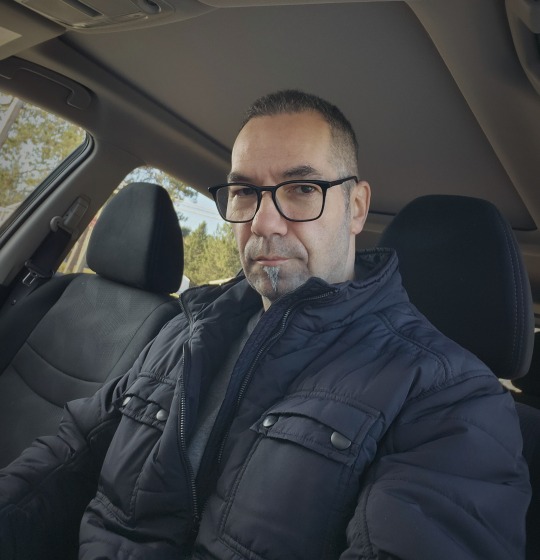
#Wolves
I need to say a few words here about Wolves and their role in biodiversity. Because I like them, but most of all, they're a must in the wilderness.
Like every time we are standing on the edge of a hiking trail of a National Park, a protected territory, we all must beware of the consequences.
Au contrary to what most people may think of its surface, no matter how large it might be, isn't big enough to sustain a healthy Wolf population over a long term. This large Predator requires a massive home range to find the prey it needs to survive. Studies have shown that all the Wolf packs in Parks must travel outside its boundaries to meet their needs. And these large Canids are also victims of habitat degradation and fragmentation, not to mention deaths of human origin.
And for people who don't know, Wolves are considered as an umbrella species. Which means that efforts to protect it benefit the entire ecosystem, since the Wolf's territory encompasses the territories of many other species with a similar home range.
As for being an apex Predators, Wolves play an important role in biodiversity. Yes, their presence has been scientifically proven to increase the abundance and diversity of plants, mamal's Birds, Amphibiants, and Reptiles. Wolves help to control the amount of Prey on their territory; this prevents an overpopulation of herbivores, which could be detrimental to plant regrowth. Wolves also give a boost to several other animal species by leaving their partially carcasses for scavengers to feed on. Through its influence on the entire food chain and by curbing excessive grazing. So yes, the Wolf is a key species needed to preserve the balance of Ecosystem.
To conclude; Wolves are very wary and will run away from any human they detect through their remarkable senses of hearing and smell - they can sniff out their Prey from more than 2kms away. Several studies have shown that Wolves will try to avoid humans at all costs and flee when approached.
Just to say that all citizens have a responsibility to protect the Wolves.
#Wolves#Wolf#Wildlife Need Protection#IUCN#International Union for Conservation of Nature#ECCC#Environment and Climate Change Canada#FeederWatch#Count Feeder Birds for Science#NCC#Nature Conservancy of Canada#Nature Photography#Nature Canada#Wild Bird Photography#Wildlife Photography#Animal Photography#Mountainous Parts of the Northern Hemisphere#Canada#The RavenKeeper
329 notes
·
View notes
Note
WAIT HELP-
soo likee, I saw a reel on ig that is like a scaramouche voice saying "You're a God, do you think I'm evil?"
AND LIKE I IMMEDIATELY THOUGHT OF YOUR ACC CUZ IT JUST FITS SO WELL WITH YOUR genshin x creator!reader STORIES😭
The reel: https://www.instagram.com/reel/C1hH_8ON8sY/?igsh=eTM0NnV5bnh5dWE0
(This isn't a req since ur reqs are currently closed I just wanted to say this :p but like, you can also do this if you want, not pressuring tho since ur prob busy^^)
A/N: the fact that you thought of me 🥹🤧
Scaramouche's thoughts spiral, the silence stretching longer. The longer your stare, the more he grows certain of what you must conclude.
With each passing second, his existence feels less worth preserving, and yet... He has come this far, and he can't help but ask the final question: "... Am I... evil?"
"No." His eyes widen, his breath catches in his throat.
No?
The word resonates within him, sending tremors of hope up his spine and through his heart. No. Scaramouche tries to take in the meaning of the word, its significance. You've never answered him like this before. "... You don't find me evil?" he finally asks, his voice cracking slightly with uncertainty.
"You're broken, you have lost all hope and believe in humanity. But your past mistakes don't make you evil, if anything they're a cry for help." Your words are an anchor that steadies him. You acknowledge his pain, his struggles... you understand him. It's an unquantifiable relief to know that you don't reject him as a hopeless cause. The floodgates inside him begin to open up, and a tide of emotions spill out. He looks up at you again, his expression vulnerable, raw.
"What do you see... now... when you look at me?," Scaramouche's voice wavers slightly. It's hard to look you in the eyes, but he won't let his gaze stray. The answer is too important. "I see a broken boy who needs help...someone." "Someone... like you?," Scaramouche's voice is as tender and fragile as a baby's, but his words carry a meaning as heavy as a boulder.
"Will you help me... be better?"
#genshin impact#genshin x reader#genshin impact x reader#genshin impact sagau#genshin sagau#sagau#genshin cult au#sagau genshin#scaramouche#sagau scaramouche#genshin scaramouche#scaramouche x reader
469 notes
·
View notes
Text
A semi-long rant about Dottore's implied self-hatred, loneliness and inner struggles
I am, like many others, endlessly fascinated by Dottore, which means that I've been sucking the game dry for any Dottore content I can find; I've watched the dialogue between him and Nahida numerous times, read the "Zandik's Legacy" notes over and over and even the description of the "Wise Doctor's Pinion" from the Pale Flame artifact set. So much has already been said about him, but I'd like to offer my own two cents about an aspect of his character that is often ignored in favor of his villainy: Dottore's inner struggles.
I'll recount everything that I've gathered and tell you of my interpretation of Dottore's character.
To start, one thing that I never see people mention is a line from Nahida's retelling of the Tatarasuna incident. In the very beginning of the cutscene, we see a monster covered in light blue fur (obviously Dottore) who Nahida describes in a very interesting way. She says:
"Once in a while, the monster would take off its fox fur at night, and lament to itself as it gazed at its reflection in the water: "I am a monstrosity, yet they are too foolish to see it. I pity them."
Of course, it's easy to say that this is just a fairy tale Nahida created to preserve Scaramouche's memories and that this could've been made up - which is only half true! We must remember that Nahida has seen Dottore's consciousness. She already knew of the arguments between his Segments when Dottore confronted her to take the Electro and Dendro gnoses. Why do I bring this specific line up, though?
Because this line outright tells us that: 1) Dottore spent sleepless nights in Tatarasuna reflecting on himself; 2) That he, perhaps sincerely, pitied the people of Tatarasuna for not seeing past his facade.
I also think that the use of the word 'lament' is very interesting. To lament means to express sorrow and regret for something. I would think that this implies Dottore feeling remorseful for not just who he was, but what he would do to Tatarasuna. To provide further proof, I think it is important to look at the expression on the furry monster's face (as Nahida portrays it) when it laments to itself:
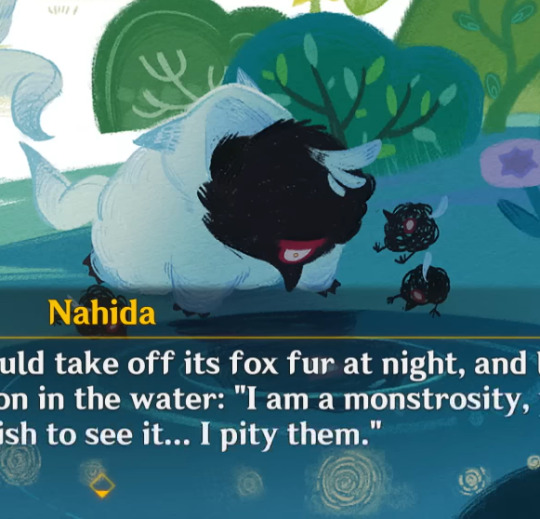
(What a cute little thing.)
It looks a bit... upset, doesn't it? Like it is mad at itself as it gazes into the water. This expression, combined with his thoughts and the use of the word 'lament' gives us a clear sign that many ignored: Dottore isn't as shallow of a villain as we thought.
Later in the cutscene, Nahida says:
"But the monster soon found solace when another came to live among the foxes who was not their kin: a kitten, carved from the wood of a white tree, who had been abandoned by the humans."
And in that moment, we see a wide-eyed little monster gazing at the kitten:

(Feels really silly to use this as an example but you've gotta trust the process)
Here, Dottore found someone like himself. An outcast, a creature that did not quite fit in with the ordinary humans - someone who could understand Dottore's loneliness and ostracization. After getting chased out of his hometown for his blasphemous ideas, after getting expelled from the Akademiya and possibly exiled to Aaru Village for his heretical views - Dottore had finally found someone to whom he could say: "See? They will never accept us. It is you and I against them, for they will never understand us."
What person wouldn't seek companionship, after all?
But things didn't turn out the way Dottore expected them to. Unlike Dottore, Scaramouche didn't need to hide his true identity in order to be accepted by the people of Tatarasuna. Thus, the following happened:
"Furious at this happy resolution, the monster lit a fire on the mountain. The terrified animals panicked as the fire spread..."
... and we know the rest. What matters is this: Dottore was angry and jealous of Scaramouche. Exiled from his hometown, rejected by his peers, insulted and looked down upon just for wanting to destroy the imbalance between Man and God - and along comes a puppet, a creation of the Raiden Shogun, who receives acceptance and guidance from the people of Tatarasuna. Not just that, but the only creature who could share Dottore's loneliness is whisked away from him, proving once again that Dottore will never know what it means to have a true companion.
Thus he tricked Scaramouche into believing that Niwa had betrayed them, had him join the Fatui and later used him as the blueprint for the creation of his Segments. Dottore basically ruined Scaramouche's life out of bitter jealousy.
That should be it about Tatarasuna for now. What I'd like to focus on next is the conversation between Dottore and Nahida in the 3.2 Archon Quest.
There are a few lines that interest me, so I'll go over them one by one.
Dottore uses a lot of big words to sound like he's saying something profound when in reality he's saying nothing at all (a nice callback to his Commedia Dell'arte counterpart), but there is one thing that both he and Nahida place great emphasis on: the fact that Dottore, smart as he is, cannot make peace with himself.
First to say it is Dottore. After asking Nahida for her opinion on his Segments, he says:
"Indeed. It's difficult for humans... to make peace with themselves, not to mention oneself from a different period."
The line still feels out of place. It sounds as if he is musing to himself.
Again, we get a line about his Segments, after Nahida asked him to erase them:
"You were observing me, and that's how you know I've long grown tired of their doubts and endless arguments."
I think it's safe to assume that the arguing is a metaphor for his struggle of self-acceptance. It seems every Segment has something to say to the others, but more on that later.
Nahida uses Dottore's own words against him:
"Like you said, it's difficult to make peace with yourself. Being as smart as you are, have you managed to do that?"
It's important to note that Dottore doesn't answer that question, but even without that, it's obvious to us, the players - of course Dottore hasn't managed to do that.
Whenever Nahida questions the relationship between his Segments, Dottore easily changes the subject. For example:
"Is the relationship between all the versions of you really that bad?"
"I don't think there's any need to dwell on that. The surplus versions of me can be exchanged for a Gnosis. Do you think anyone can offer themselves at a higher price?"
His Segments all argue constantly. When considered that they are replicas of Dottore at different stages of his life, this takes on an entirely new meaning - beyond his facade, Dottore is a man who can barely make out who he is.
Consider this also: in "A Winter Night's Lazzo", Columbina tells him, "You're looking very young today, Doctor."
To which Dottore replies, "You know very well that I do not take that as a compliment."
A piece of dialogue that had been brushed off by many, myself included - until I realized what this might imply. Dottore finds Columbina's comment insulting because he hates who he is. He hates the younger versions of himself because they represent a Dottore who didn't have the knowledge he has at this current stage of his life. They weren't as smart, as knowledgeable. But that's not really the full extent of it, of course.
Dottore was never fully accepted by anyone, this we have established. In the Akademiya, the students called him a 'madman', a 'monster' (as said in the Wise Doctor's Pinion). When we meet him in the 3.1 Archon Quest, he is referred to as 'The Outcast'. He is always being alienated, but could we assume that he just accepted this rejection and decided to embrace the titles people had thrown at him? This is just... very bold speculation, of course. It is impossible to deny that Dottore didn't always naturally stand out due to his heretical views, but I think it's worth considering that he could have just chosen to be the monster people thought of him as. After all, in the confrontation between him and Niwa, Dottore tells Niwa to think of him as a monster and a demon (for a reason that was... meant to be comforting? Not very important right now).
Consider also how different all the Segments sounded when they found out that they were being erased. All of the voices, along with their manner of speech, varied greatly; I interpreted this as proof of the many masks Dottore has worn over the course of his life. Dottore abandoned whatever humanity he had and decided to embrace the mask of a monster, constantly reinventing himself because he isn't secure in his identity - perhaps he doesn't have one at all. He is a scholar, a Harbinger, a researcher - but without those titles, what is left? What is he left with when he sheds those facades? The constant dodging of Nahida's questions about his Segments, the arguments and the worries of said Segments, the introspection in the cutscene about the Tatarasuna incident - indeed, Dottore is a man filled with self-hatred. A lonely outcast who has never known the comfort of kinship. A monster who swallowed his loneliness and dedicated his life to research.
That should be it, I suppose. My brain is fried and if I remember anything that I might have missed, I'll add that info later.
I want to mention one thing: this doesn't mean Dottore is a misunderstood good guy - doesn't take a genius to know that that is not true. Dottore has no regard for human life (which is ironic, considering how he believes humans have great potential and he wants them to be equal with the Gods). He has hurt so many and I'm sure he will continue to do so. He is evil, but it should be noted that he was once just an ordinary human, too. There must be an explanation for why he is the way he is. It's easy to paint him as just a monster because damn he's good at what he does; but I like to think that there is a layer to him that we just haven't fully seen yet. I'm excited to find out more about him when Snezhnaya gets released in like 2 years... ha. If you've read this far, thank you a lot! Curious to know what you guys think. I love Dottore
669 notes
·
View notes
Text
One of the problems with science fiction is that there is no secular term for the soul. It's a religious concept with no scientific basis, but artistically it conveys a very important idea that I think sometimes gets lost in sci-fi. It's a simple term for an important idea that gets rejected out-of-hand because it's a religious idea, but it actually matters a great deal for non-religious reasons.
In essence, soul is an easy shorthand for the breadth of one's inherent, individual being-ness. To avoid the kneejerk associations that sci-fi fans have to the word "soul", I tend to use "continuity of consciousness" to try and explain this idea. But a lot of times people still don't quite seem to grasp it.
In essence, there is a tendency in sci-fi to think of people externally. A person is their demonstrable factors. Their appearance, their personality, their memory, their experience, all things that can be interacted with or recreated through the magic of super-science.
If you clone Joe, then the result is Joe! We brought Joe back to life through cloning. Now Joe is here with us again. And if we clone Joe again, we get two Joes! Isn't that amazing? And they're both Joe!
But.
Like.
We don't think of people internally. Are they both Joe? Is either of them even Joe? Or are they brand new people saddled with Joe's memories and personality and history?
What happened to Joe? We're only thinking about Joe in terms of our perspective as people who are not Joe, but what was Joe's experience? Did he actually die, and then wake up in a new clone body? Is his continuity of consciousness preserved? Did he actually experience coming back to life? Or did Joe die, and now Joe is still just dead. And there's been a new consciousness created to inhabit the clone?
What does this experience look like from Joe's perspective? Not Clone Joe. Original Joe.
Severed from its religious meaning, this is what the soul is an artistic shorthand for. Joe's "soul" is a simple and easy way of conveying the question, what actually happened to the inherent consciousness/personhood/continuous thinking existence of the true Joe? Does the clone share the same "soul" or does it have a new "soul"? Do their consciousnesses continue from one to another or are their consciousnesses separate?
Even calling it "consciousness" doesn't fully convey this idea. Because they can have different answers for that. The clone may feel that their consciousness extends back throughout Joe's death and life, while the original Joe's consciousness nonetheless ended at death. There is no secular term for the inherent quality of a continuity of individually existing, in and of itself.
And because there's no secular term, we just don't think about it.
But I do. I think about this every time I'm presented with a clone or a time-travel duplicate or a parallel universe counterpart, and told by the story to treat them as if they were the same. If this character does not share continuity of the original's consciousness, then they are not the same. Even if all other features are identical.
And I don't know how to express that with words.
717 notes
·
View notes
Text
Ok that Stonehearts trailer is making me think more about the IPC and I need to yap
The thing that struck me the most while i was watching it was this sequence of events where the resources bleeding out from the colonized planets was the thing that healed the cornerstone, but then opal says that "we will follow the preservation to the end"
this violent colonization (look at boothill's planet) inherently goes against everything the preservation stands for, so why are the stonehearts even able to call themselves followers of the preservation, much less draw power from it like the cornerstones themselves?

it could be linked to the IPC voracity theory but i dont like that theory so i won't go too in depth on it. it makes sense, but it's a bit boring tbh.
instead, let's get bogged down in semantics and interpretations of what 'preservation' can be seen as
because i think that's more interesting and can explain why the ipc follows the preservation and why qlipoth is fine with the ipc using their power.
the word preservation means "maintaining something in it's original state", "retaining a state of affairs", "maintaining a quality of something", "keeping something safe from harm or injury" and those are just 4 contexts where the meaning of the world is a bit different.

as we know, people can follow a path but not agree with all of it's ideals (lan was born to destroy the abundance, yet galaxy rangers, who don't care about the hunt-abundance feud, exist and can draw power from the path of the hunt). and since we know there are so many interpretations of the WORD preservation, it makes me wonder if the stonehearts do care about 'preservation', but fix it to suit their own need.

i think the clearest example of these extraordinary interpretations of preservation come with obsidian.
(notice how the stones of the more scheming, bloodthirsty stonehearts are right next to diamond (opal and obsidian), while amber (who "prefers to remain neutral") and topaz (who is seen as the least controversial) are much further away?)
obsidian's interpretation of preservation
aside from being another gorgeous dangerous lady voiced by the wonderful Erin Yvette (yay!!), obisidan is clearly a bit loopy. BUT, she draws power from the preservation (she has a cornerstone, and is a high rank in the ipc, p46, only being under diamond, a confirmed emanator, at p47.) so how does she interpret "preservation" to exist as such a contradictory state to the safety that qlipoth wants to provide?
i think her form of preservation is the preservation of the selfish part of humanity and the preservation of human indulgence.


firstly, we can see from her luxurious home, with everything enlaid with obsidian and covered in blood, shows the materialistic and violent side of obsidian's selfishness. she's here when making a decision about aventurine's fate, and her only comment about it is that SHE would "like everything to become more of a bloodbath". she doesn't care about him individually, she just cares about manipulating the status quo to suit herself - which she can easily achieve in the selfish and greedy ipc.
obsidian, as a stoneheart, being a famous person within the ipc, and an important ipc representative in the cosmos, can also serve as a personification for the cruellest parts of the ipc - the colonization, the violence. its important to recognize that obsidian is pretty, but that's just meant to MAKE us like her, so we ignore the wrongdoings of the ipc.
this wish of her's to maintain the status quo and only manipulate it when it suits her also links her to opal, who seems eager to rush off and get more power from diamond in the upcoming war among the aeons. opal seems to be selfish and manipulative too. i imagine they're quite the devilish pair when they want something.



i also think obsidian has something to do with life, considering the pomegranates (which represent life) we see next to her bath of blood, and also that obsidian blades were used in the distant past, and that obsidian is formed by volcanos (something destructive that also keeps life in check. the aftermath of volcanic eruptions is death, but also fertile lands).
considering these links to life (pomegranates), death (her love for bloodbaths and watching prey suffer), and pleasure (her extravagant home and preference to indulge in her violent hobbies), it seems that her view of preservation is one that encourages the preservation of the self indulgent, selfish side of humanity.
i think her having so many links to life, death and pleasure can also link to the ipc's motto "all for the amber lord" - everything, life, death and pleasure are all the domain of qlipoth and can be manipulated as much as anyone likes, as long as it suits the ipc and therefore qlipoth.
her viewpoint is that things should remain as they are, and that humanity should remain selfish and self-indulgent (which obsidian relates to, she has her obsidian bath of blood and her wine in her goblet, she wants to relish in the thrill of the hunt of her prey).
(of course, i'm going off of 2 pieces of symbolism, but stick with me. i wonder if any of this will turn out to be right? also HOORAY ERIN YVETTE VOICING SOMEONE IN HSR!!!)
120 notes
·
View notes
Text
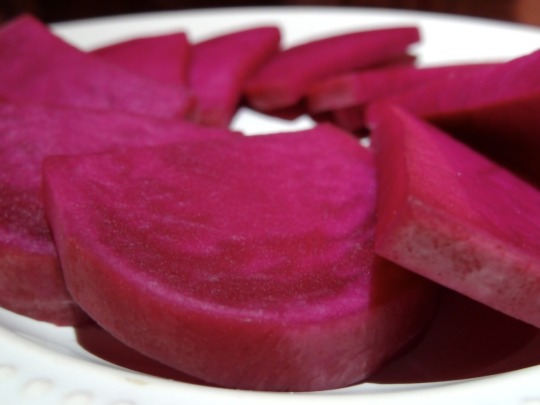
[ID: A circle of overlapping semi-circular bright pink pickles arranged on a plate, viewed from a low angle. End ID]
مخلل اللفت / Mukhallal al-lifit (Pickled turnips)
The word "مُخَلَّل" ("mukhallal") is derived from the verb "خَلَّلَ" ("khallala"), meaning "to preserve in vinegar." "Lifit" (with diacritics, Levantine pronunciation: "لِفِتْ"), "turnip," comes from the root "ل ف ت", which produces words relating to being crooked, turning aside, and twisting (such as "لَفَتَ" "lafata," "to twist, to wring"). This root was being used to produce a word meaning "turnip" ("لِفْتْ" "lift") by the 1000s AD, perhaps because turnips must be twisted or wrung out of the ground.
Pickling as a method of preserving produce so that it can be eaten out of season is of ancient origin. In the modern-day Levant, pickles (called "طَرَاشِيّ" "ṭarāshiyy"; singular "طُرْشِيّ" "ṭurshiyy") make up an important culinary category: peppers, carrot, olives, eggplant, cucumber, cabbage, cauliflower, and lemons are preserved with vinegar or brine for later consumption.
Pickled turnips are perhaps the most commonly consumed pickles in the Levant. They are traditionally prepared during the turnip harvest in the winter; in the early spring, once they have finished their slow fermentation, they may be added to appetizer spreads, served as a side with breakfast, lunch, or dinner, eaten on their own as a snack, or used to add pungency to salads, sandwiches, and wraps (such as shawarma or falafel). Tarashiyy are especially popular among Muslim Palestinians during the holy month of رَمَضَان (Ramaḍān), when they are considered a must-have on the إِفْطَار ("ʔifṭār"; fast-breaking meal) table. Pickle vendors and factories will often hire additional workers in the time leading up to Ramadan in order to keep up with increased demand.
In its simplest instantiation, mukhallal al-lifit combines turnips, beetroot (for color), water, salt, and time: a process of anaerobic lacto-fermentation produces a deep transformation in flavor and a sour, earthy, tender-crisp pickle. Some recipes instead pickle the turnips in vinegar, which produces a sharp, acidic taste. A pink dye (صِبْغَة مُخَلَّل زَهْرِي; "ṣibgha mukhallal zahri") may be added to improve the color. Palestinian recipes in particular sometimes call for garlic and green chili peppers. This recipe is for a "slow pickle" made with brine: thick slices of turnip are fermented at room temperature for about three weeks to produce a tangy, slightly bitter pickle with astringency and zest reminiscent of horseradish.
Turnips are a widely cultivated crop in Palestine, but, though they make a very popular pickle, they are seldom consumed fresh. One Palestinian dish, mostly prepared in Hebron, that does not call for their fermentation is مُحَشّي لِفِتْ ("muḥashshi lifit")—turnips that are cored, fried, and stuffed with a filling made from ground meat, rice, tomato, and sumac or tamarind. In Nablus, tahina and lemon juice may be added to the meat and rice. A similar dish exists in Jordan.
Turnips produced in the West Bank are typically planted in open fields (as opposed to in or under structures such as plastic tunnels) in November and harvested in February, making them a fall/winter crop. Because most of them are irrigated (rather than rain-fed), their yield is severely limited by the Israeli military's siphoning off of water from Palestine's natural aquifers to settlers and their farms.
Israeli military order 92, issued on August 15th, 1967 (just two months after the order by which Israel had claimed full military, legislative, executive, and judicial control of the West Bank on June 7th), placed all authority over water resources in the hands of an Israeli official. Military order 158, issued on November 19th of the same year, declared that no one could establish, own, or administer any water extraction or processing construction (such as wells, water purification plants, or rainwater collecting cisterns) without a new permit. Water infrastructure could be searched for, confiscated, or destroyed at will of the Israeli military. This order de facto forbid Palestinians from owning or constructing any new water infrastructure, since anyone could be denied a permit without reason; to date, no West Bank Palestinian has ever been granted a permit to construct a well to collect water from an aquifer.
Nearly 30 years later, the Interim Agreement on the West Bank and the Gaza Strip (also called the Oslo II Accord or the Taba Agreement), signed by Israel and the Palestine Liberation Organization (PLO) in 1995, officially granted Israel the full control over water resources in occupied Palestine that it had earlier claimed. The Argreement divided the West Bank into regions of three types—A, B, and C—with Israel given control of Area C, and the Palestinian Authority (PA) supposedly having full administrative power over Area A (about 3% of the West Bank at the time).
In fact, per article 40 of Annex 3, the PA was only allowed to administer water distribution in Area A, so long as their water usage did not exceed what had been allocated to them in the 1993 Oslo Accord, a mere 15% of the total water supply: they had no administrative control over water resources, all of which were owned and administered by Israel. This interim agreement was to be returned to in permanent status negotiations which never occurred.
The cumulative effect of these resolutions is that Palestinians have no independent access to water: they are forbidden to collect water from underground aquifers, the Jordan River, freshwater springs, or rainfall. They are, by law and by design, fully reliant on Israel's grid, which distributes water very unevenly; a 2023 report estimated that Israeli settlers (in "Israel" and in the occupied West Bank) used 3 times as much water as Palestinians. Oslo II estimations of Palestinians' water needs were set at a static number of million cubic meters (mcm), rather than an amount of water per person, and this number has been adhered to despite subsequent growth in the Palestinian population.
Palestinians who are connected to the Israeli grid may open their taps only to find them dry (for as long as a month at a time, in بَيْت لَحْم "bayt laḥm"; Bethlehem, and الخَلِيل "al-khalīl"; Hebron). Families rush to complete chores that require water the moment they discover the taps are running. Those in rural areas rely on cisterns and wells that they are forbidden to deepen; new wells and reservoirs that they build are demolished in the hundreds by the Israeli military. Water deficits must be made up by paying steep prices for additional tankards of water, both through clandestine networks and from Israel itself. As climate change makes summers hotter and longer, the crisis worsens.
By contrast, Israeli settlers use water at will. Israel, as the sole authority over water resources, has the power to transfer water between aquifers; in practice, it uses this authority to divert water from the Jordan River basin, subterranean aquifers, and بُحَيْرَة طَبَرِيَّا ("buḥayrat ṭabariyyā"; Lake Tiberias) into its national water carrier (built in 1964), and from there to other regions, including the Negev Desert (south of the West Bank) and settlements within the West Bank.
Whenever Israel annexes new land, settlers there are rapidly given access to water; the PA, however, is forbidden to transport water from one area of the West Bank to another. Israel's control over water resources is an important part of the settler colonial project, as access to water greatly influences the desirability of land and the expected profit to be gained through its agricultural exports.
The result of the diversion of water is to increase the salinity of the Eastern Aquifer (in the West Bank, on the east bank of the Jordan River) and the remainder of the Jordan that flows into the West Bank, reducing the water's suitability for drinking and irrigation; in addition, natural springs and wells in Palestine have run dry. In this environment, water for drinking and watering crops and livestock is given priority, and many Palestinians struggle to access enough water to shower or wash clothing regularly. In extreme circumstances, crops may be left for dead, as Palestinian farmers instead seek out jobs tending Israeli fields.
Some areas in Palestine are worse off in this regard than others. Though water can be produced more easily in the قَلْقِيلية (Qalqilya), طُولْكَرْم (Tulkarm) and أَرِيحَا ("ʔarīḥā"; Jericho) Districts than in others, the PA is not permitted to transfer water from these areas to areas where water is scarcer, such as the Bethlehem and Al-Khalil Districts. In Al-Khalil, where almost a third of Palestinian acreage devoted to turnips is located [1], and where farming families such as the Jabars cultivate them for market, water usage averaged just 51 liters per person per day in 2020—compare this to the West Bank Palestinian average of 82.4 liters, the WHO recommended daily minimum of 100 liters, and the Israeli average of 247 liters per person per day.
As Israeli settlement גִּבְעַת חַרְסִינָה (Givat Harsina) encroached on Al-Khalil in 2001, with a subdivision being built over the bulldozed Jabar orchard, the Jabars reported settlers breaking their windows, destroying their garden, throwing rocks, and holding rallies on the road leading to their house. In 2010, with the growth of the קִרְיַת־אַרְבַּע (Kiryat Arba) settlement (officially the parent settlement of Givat Harsina), the Jabars' entire irrigation system was repeatedly torn out, with the justification that they were stealing water from the Israeli water authority; the destruction continued into 2014. Efforts at connecting and expanding Israeli settlements in the Bethlehem area continue to this day.
Thus we can see that water deprivation is one tool among many used to drive Palestinians from their land; and that it is connected to a strategy of rendering agriculture impossible or unprofitable for them, forcing them into a state of dependence on the Israeli economy.
Turnips, as well as cabbage and chili peppers, are also grown in the village of وَادِي فُوقِين (Wadi Fuqin), west of Bethlehem. In 2014, Israel annexed about 1,250 acres of land in Wadi Fuqin, or a third of the village's land, "effectively [ruling] out development of the village and its use of this land for agriculture." Most of this land lies immediately to the west of a group of settlements Israel calls גּוּשׁ עֶצְיוֹן ("Gush Etzion"; Etzion Bloc). Building here would link several non-contiguous Israeli settlements with each other and with القدس (Al-Quds; "Jerusalem"), hemming Palestinians of the region in on all sides (many main roads through Israeli settlements cannot be used by anyone with a Palestinian ID). [2] PLO executive committee member Hanan Ashrawi said that the annexation, which was carried out "[u]nder the cover of [Israel's] latest campaign of aggression in Gaza," "represent[ed] Israel’s deliberate intent to wipe out any Palestinian presence on the land".
This, of course, was not the beginning of this strategy: untreated sewage from Gush Etzion settlements had been contaminating crops, springs, and groundwater in Wadi Fuqin since 2006, which also saw nearly 100 acres of Palestinian land annexed to allow for expansion of the Etzion Bloc.
All of this has obviously had an effect on Palestinian agriculture. A 1945–6 British survey of vegetable production in Palestine found that 992 dunums were devoted to Arab turnip production (954 irrigated and 38 rain-fed; no turnip production was attributed to Jewish settlers). A March 1948 UN report claimed that "[i]n most districts the markets are well-supplied with all the common winter vegetables—cabbages, cauliflowers, lettuce and spinach; carrots, turnips and and beets; beans and peas; green onions, eggplants, marrows and tomatoes." By 2009, however, the area given to turnips in Palestine had fallen to 918 dunums. Of these, 864 dunums were irrigated and 54 rain-fed. This represents an increase in unirrigated turnips (5.8%, up from 3.9%) that is perhaps related to difficulty in obtaining sufficient water.
Meanwhile, Israel profits from its restriction of Palestinian agriculture; it is the largest exporter of turnips in West Asia (I found no data for turnip exports from Palestine after 1922, suggesting that the produce is all for local consumption).
The pattern that Ashrawi called out in 2014 continued in 2023, as Israel's genocide in Gaza occurs alongside the continued and escalating killing and expulsion of West Bank Palestinians. The 2014 annexations, which represented the largest land grab for over 30 years and which appeared to institute a new era of state policy, have been followed up in subsequent years with more land claims and settlement-building.
Israeli military and settler raids and massacres in the West Bank, which had already killed 248 in 2023 before the حَمَاس (Hamas) October 7 offensive had taken place, accelerated after the attack, with forced expulsions of Palestinians (including Bedouin Arabs), and harassment, raids, kidnappings, and torture of Palestinians by a military armed with rifles, tanks, and drones. This violence has been opposed by armed resistance groups, who defend refugee camps from military raids with strategies including the use of improvised explosives.
Support Palestinian resistance by buying an e-sim for distribution in Gaza; donating to help two Gazans receive medical care; or donating to help a family leave Gaza.
[1] 918 dunums were devoted to turnips according to the Palestinian Central Bureau of Statistics (PCBS) report for 2009; the 2008 PCBS report attributes 253 dunums of turnip cultivation to Al-Khalil ("Hebron") for 2006–7.
[2] Today, Gush Etzion is connected to Al-Quds by an underground road that runs beneath the Palestinian Christian town of بَيتْ جَالَا (Bayt Jala).
Ingredients:
Makes 2 1-liter mason jars.
500g (4 medium) turnips
1 beetroot
1 medium green chili pepper (فلفل حار خضرة), halved
2 small cloves garlic, peeled
1 liter (4 cups) distilled or filtered water
25g coarse sea salt (or substitute an equivalent weight of any salt without iodine)
Some brining recipes for lifit call for the addition of a spoonful of sugar. This will increase the activity of lactic-acid-producing bacteria at the beginning of the fermentation, producing a quicker fermentation and a different, sourer flavor profile.
Instructions:
1. Clean two large mason jars thoroughly in hot water (there is no need to sterilize them).
2. Scrub vegetables thoroughly. Cut the top (root) and bottom off of each turnip. Cut each turnip in half (from root end to bottom), and then in 1 cm (1/2") slices (perpendicular to the last cut). Prepare the beetroot the same way.
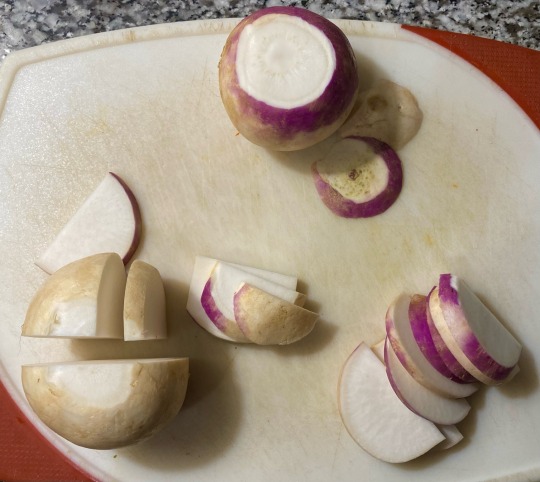
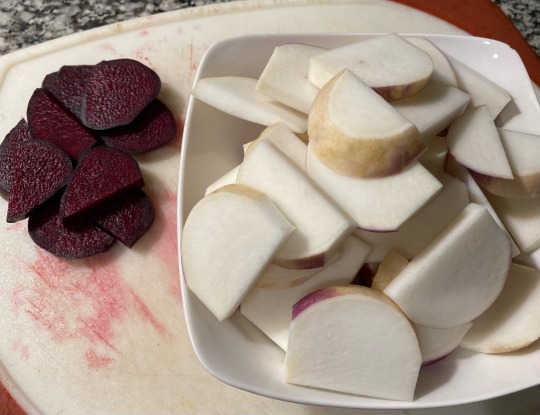
If you need your pickles to be finished sooner, cut the turnips into thinner slices, or into thick (1/2") baton shapes; these will need to be fermented for about a week.
3. Arrange turnip and beet slices so that they lie flat in your jars. Add garlic and peppers.
4. Whisk salt into water until dissolved and pour over the turnips until they are fully submerged. Seal with the jar's lid and leave in a cool place, or the refrigerator, for 20–24 days.
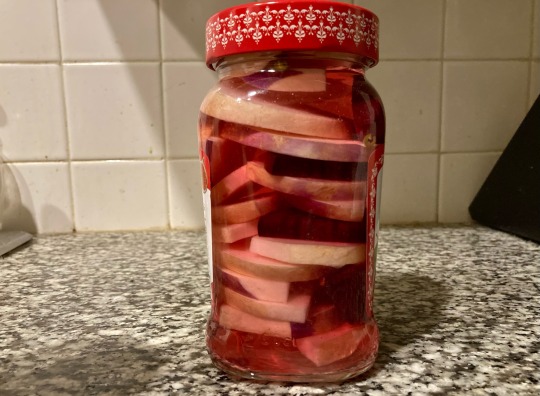
The amount of brine that you will need to cover the top of the vegetables will depend on the shape of your jar. If you add more water, make sure that you add more salt in the same ratio.
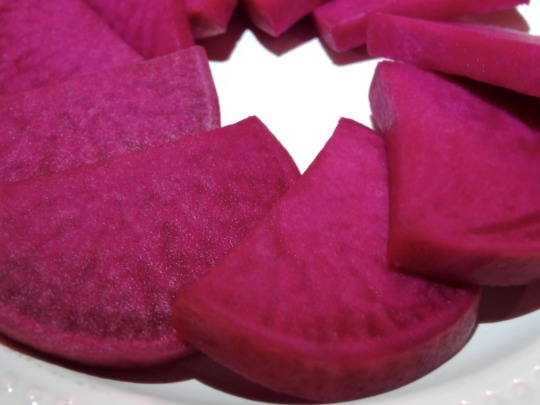
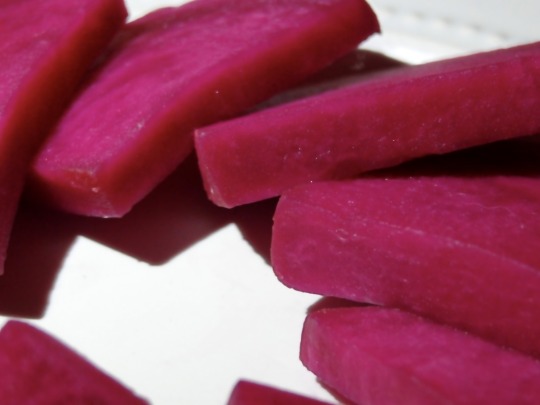
294 notes
·
View notes